Soft Machine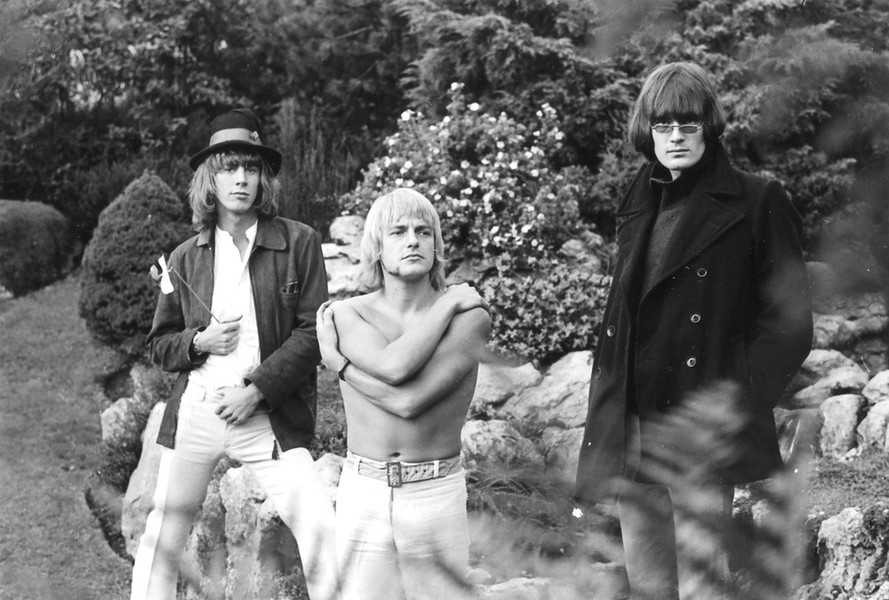 | ||
| Allmusic Biography : Soft Machine were never a commercial enterprise and indeed remain unknown even to many listeners who came of age during the late 60s and early 70s, when the group was at its peak. In their own way, however, they were one of the more influential bands of their era, and certainly one of the most influential underground outfits. One of the original British psychedelic groups, they were instrumental in the birth of both progressive rock and jazz-rock. They were also the central foundation of the family tree of the "Canterbury Scene" of British progressive rock acts, a movement that also included Caravan, Gong, Matching Mole, Hatfield and the North, and National Health, not to mention the distinguished pop music careers of founding members Robert Wyatt and Kevin Ayers and the jazz and jazz-rock explorations of saxophonist Elton Dean and bassist Hugh Hopper. Their sound, in all incarnations, revealed top-flight musicianship, compelling -- if sometimes difficult -- compositions filled with key, dynamic, and tempo changes, all played to underscore their individual and collective abilities to perform those compositions in any setting. During Wyatts tenure, they also possessed a sense of perverse whimsy about pop music, which was forsaken after his departure from the group. Considering their well-known experimental and avant-garde leanings, the roots of Soft Machine were in some respects surprisingly conventional. In the mid-60s, Wyatt sang and drummed with the Wilde Flowers, a Canterbury group that played more or less conventional pop and soul covers of the day. Future Soft Machine members Ayers and Hopper would also pass through the Wilde Flowers, whose original material began to reflect an odd sensibility, cultivated by their highly educated backgrounds and a passion for improvised jazz. In 1966, Wyatt teamed up with bassist/singer Ayers, keyboardist Mike Ratledge, and Australian guitarist Daevid Allen to form the first lineup of Soft Machine. This incarnation of the group, along with Pink Floyd and Tomorrow, were the very first underground psychedelic bands in Britain, and quickly became well-loved in the burgeoning London psychedelic underground. Their first recordings (many of which only surfaced years later on compilations of 1967 demos) were by far their most pop-oriented, which doesnt mean they werent exciting or devoid of experimental elements. Surreal wordplay and unusually (for rock) complex instrumental interplay gave an innovative edge to their ebullient early psychedelic outings. They only managed to cut one (very good) single, though, which flopped. Allen, the weirdest of a colorful group of characters, had to leave the band when he was refused reentry into the U.K. after a stint in France, due to the expiration of his visa. The remaining trio recorded its first proper album, Soft Machine [Volume One], for ABC/Probe in 1968. The considerable melodic elements and vocal harmonies of their 1967 recordings were now giving way to more challenging, artier postures that sought -- sometimes successfully, sometimes not -- to meld the energy of psychedelic rock with the improvisational pulse of jazz. The Softs were taken on by Jimi Hendrixs management, leading to grueling stints supporting the Jimi Hendrix Experience on their 1968 American tours. Because of this, the group at this point was probably more well-known in the U.S. than in its homeland. In fact, the debut LP was only issued in the States. For a couple of months in 1968, Soft Machine became a quartet again with the addition of future Police guitarist Andy Summers, although that didnt work out, and they soon reverted to a trio. The punishing tours took their toll on the group, and Ayers had left by the end of 1968, to be replaced by Wyatts old chum Hugh Hopper. Their second ABC/Probe album, Volume Two (1969), further submerged the bands pop elements in favor of extended jazzy compositions, with an increasingly lesser reliance on lyrics and vocals. Ratledges buzzy organ, Hoppers fuzz bass, and Wyatts pummeling, imaginative drumming and scat vocals paced the band on material that became increasingly whimsical and surrealistic, if increasingly inaccessible to the pop/rock audience. For the 1970 double-LP opus Third, their first album for Columbia, they went even further in these directions, expanding to a seven-piece by adding a horn section. This record virtually dispensed with vocals -- aside from Wyatts side-long "Moon in June" -- and conventional rock songs entirely, and is considered a landmark by both progressive rock and jazz-rock aficionados (upon its release, the album was hailed as a popular music milestone by The Village Voice), though it was too oblique for some rock listeners. Notably, Third marked the first appearance on a Softs disc by saxophonist Elton Dean, whose contributions on alto and saxello would, along with Ratledges fuzz organ and Hoppers fuzz bass, become key elements of the bands signature instrumental sound. Soft Machine couldnt afford to continue to support a seven-member lineup, and scaled back to what was later deemed by some listeners to be "the classic quartet" -- Ratledge, Wyatt, Hopper, and Dean -- for 1971s Fourth (also on Columbia), although the group was augmented by a number of guest musicians, including bassist Roy Babbington, who would become a permanent bandmember later. Wyatt left by the end of 1971, briefly leading the similar Matching Mole, and then establishing a long-running solo career. In doing so he was following the path of Kevin Ayers, who already had several solo albums to his credit by the early 70s; Daevid Allen, for his part, had become a principal of Gong, one of the most enigmatic of 70s progressive rock bands (which continued in various incarnations into the 21st century). Meanwhile, as of 1972 saxophonist Dean was pulling the band in a free jazz, more fully improvised direction, which led to the brief appearance of Phil Howard as drummer on the first side of that years Fifth (the third Soft Machine album on Columbia). However, Ratledge and Hopper prevailed in favor of John Marshall as a replacement for Howard, and Marshall appeared as drummer on the second side of Fifth and all the Soft Machine albums to follow. Dean also left by 1973s Columbia double LP Six (one disc live, and one recorded in the studio), replaced by keyboardist/reedman/composer Karl Jenkins. Hopper would be next to leave, with Babbington taking his place on bass, and by then (the release of 1973s Seven, Soft Machines final Columbia album before signing with Harvest) Ratledge was the last original member in the band. (In fact, since Marshall, Jenkins, and Babbington were all former members of Nucleus, the group had evolved into a curious mix of three-fourths Nucleus and one-fourth Soft Machine.) By now, Ratledge himself was beginning to lose interest during the bands so-called fusion years, and as Jenkins began focusing more exclusively on keyboards and dropping his reeds during the mid-70s, Ratledges retreat became all the more inevitable. The soloing spotlight shifted to a new recruit, guitarist Allan Holdsworth, on the groups 1975 Harvest debut, Bundles, and then guitarist John Etheridge (who replaced Holdsworth in April 1975) on the following years Harvest follow-up, Softs -- on which Ratledge was relegated to "guest" status after departing the group in early 1976 when that albums recording sessions were underway. The band now known as Soft Machine -- but with no original members whatsoever -- still managed a decent fusion-oriented album with the 1978 Harvest-issued Alive and Well: Recorded in Paris, but lackluster efforts like 1981’s Land of Cockayne (featuring Jack Bruce on bass) and 1994s Rubber Riff (actually a 70s-era album of Jenkins library music rebranded as Soft Machine) were truly Soft Machine in name only. The following decades would see Elton Dean and Hugh Hopper particularly willing to continue Soft Machine-related journeys in groups like Soft Heap, Soft Works, and Soft Machine Legacy, although their deaths in the 2000s -- Dean in 2006 and Hopper in 2009 -- seemed to put a final end to the groups jazz-rock thread. Nevertheless, as of 2010 drummer Marshall, guitarist Etheridge, and bassist Babbington (all of whom appeared on Softs in 1976) could be heard along with former Gong reedman Theo Travis on the Soft Machine Legacy album Live Adventures, released by the MoonJune label and featuring an abbreviated version of Hoppers "Facelift," the album-opening track from the Softs heralded 1970 Columbia double LP, Third. And thanks to labels such as Cuneiform and Voiceprint, many archival recordings of the various incarnations of Soft Machine continued to be released into the 21st century. Meanwhile, of the bands original members, Daevid Allen and Robert Wyatt remained involved with various music-making projects while Mike Ratledge had long since disappeared from the public eye. Kevin Ayers released a well-received solo album, The Unfairground, in 2007, but his later years were largely spent in seclusion in the south of France; he died at home in Montolieu, France in February 2013 at the age of 68. And after battling cancer, Daevid Allen died in Australia in March 2015 at the age of 77. In December 2015, it was confirmed that the band had dropped the "Legacy" tag from their name, as it featured three of the groups 70s-era members -- Etheridge, Marshall, and Babbington, as well as Travis. After playing selective shows over the next two years, the band convened in Jon Hisemans Temple Studio in Surrey, England, at the end of 2017, some 50 years since the release of their 1968 debut album. The finished recordings resulted in the album Hidden Details, and offered a portrait of an active, contemporary outfit delivering on its own agenda. Though informed by the past, the new music was far from beholden to it. Hidden Details was released by MoonJune in September 2018, followed by an international tour. | ||
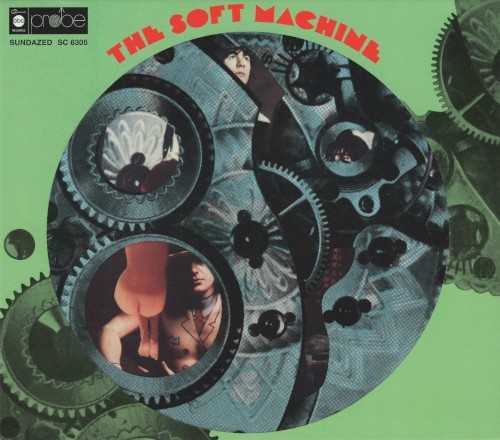 | Album: 1 of 47 Title: The Soft Machine Released: 1968-12 Tracks: 13 Duration: 36:57 Scroll: Up Down Top Bottom 25% 50% 75% Spotify Wikipedia Allmusic AlbumCover | 1 Hope for Happiness (04:22) 2 Joy of a Toy (02:56) 3 Hope for Happiness (reprise) (01:31) 4 Why Am I So Short? (02:33) 5 So Boot If at All (02:33) 6 A Certain Kind (04:06) 7 Save Yourself (02:26) 8 Priscilla (01:05) 9 Lullabye Letter (04:26) 10 We Did It Again (03:40) 11 Plus belle qu’une poubelle (01:05) 12 Why Are We Sleeping? (05:26) 13 Box 25/4 Lid (00:48) |
| The Soft Machine : Allmusic album Review : A wild, freewheeling, and ultimately successful attempt to merge psychedelia with jazz-rock, Soft Machines debut ranges between lovingly performed oblique pop songs and deranged ensemble playing from drummer/vocalist Robert Wyatt, bassist Kevin Ayers and organist Mike Ratledge. With only one real break (at the end of side one), the songs merge into each other -- not always smoothly, but always with a sense of flair that rescues any potential miscues. Wyatt takes most of the vocals, and proves himself a surprisingly evocative singer despite his lack of range. Like Pink Floyds The Piper at the Gates of Dawn, Vol. 1 was one of the few over-ambitious records of the psychedelic era that actually delivered on all its incredible promise. | ||
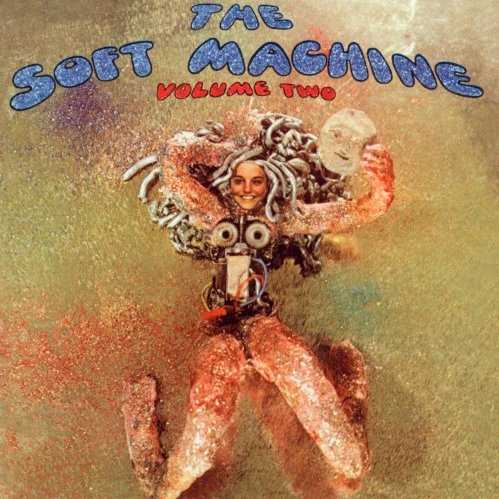 | Album: 2 of 47 Title: Volume Two Released: 1969-04 Tracks: 17 Duration: 33:33 Scroll: Up Down Top Bottom 25% 50% 75% Spotify Allmusic Wikipedia AlbumCover | 1 Pataphysical Introduction, Part I (01:00) 2 A Concise British Alphabet, Part I (00:09) 3 Hibou, Anemone and Bear (05:59) 4 A Concise British Alphabet, Part II (00:12) 5 Hulloder (00:54) 6 Dada Was Here (03:25) 7 Thank You Pierrot Lunaire (00:48) 8 Have You Ever Bean Green? (01:19) 9 Pataphysical Introduction, Part II (00:51) 10 Out of Tunes (02:34) 11 As Long as He Lies Perfectly Still (02:34) 12 Dedicated to You but You Weren’t Listening (02:32) 13 Fire Engine Passing With Bells Clanging (01:50) 14 Pig (02:09) 15 Orange Skin Food (01:47) 16 A Door Opens and Closes (01:09) 17 10:30 Returns to the Bedroom (04:13) |
| Volume Two : Allmusic album Review : The first Soft Machine LP usually got the attention, with its movable parts sleeve, as well as the presence of ultra-talented songwriter Kevin Ayers. But musically, Volume Two better conveys the Dada-ist whimsy and powerful avant rock leanings of the band. Hugh Hopper took over for Ayers on bass, and his fuzz tones and experimental leanings supplanted Ayers pop emphasis. The creative nucleus behind this most progressive of progressive rock albums, however, is Robert Wyatt. He provides the musical arrangements to Hoppers quirky ideas on the stream-of-consciousness collection of tunes ("Rivmic Melodies") on side one. Unlike the first record, which sounded choppy and often somnolent, this one blends together better, and it has a livelier sound. The addition of session horn players enhanced the Softs non-guitar lineup, and keyboardist Mike Ratledge, whose musical erudition frequently clashed in the early days with the free-spirited Wyatt, Ayers, and Daevid Allen, lightened his touch here. He even contributes one of the albums highlights with "Pig" ("Virgins are boring/They should be grateful for the things theyre ignoring"). But its Wyatt who lifts this odd musical jewel to its artistic heights. He uses his tender voice like a jazz instrument, scatting (in Spanish!) on "Dada Was Here," and sounding entirely heartfelt in "Have You Ever Bean Green," a brief tribute to the Jimi Hendrix Experience, with whom the Softs toured ("Thank you Noel and Mitch, thank you Jim, for our exposure to the crowd"). Fans of the Canterbury scene will also relish "As Long as He Lies Perfectly Still," a loving tribute to ex-bandmate Ayers. This is the one record that effectively assimilates rock, absurdist humor, jazz, and the avant-garde, and it misses classic status only due to some dissonant instrumentation on side two. | ||
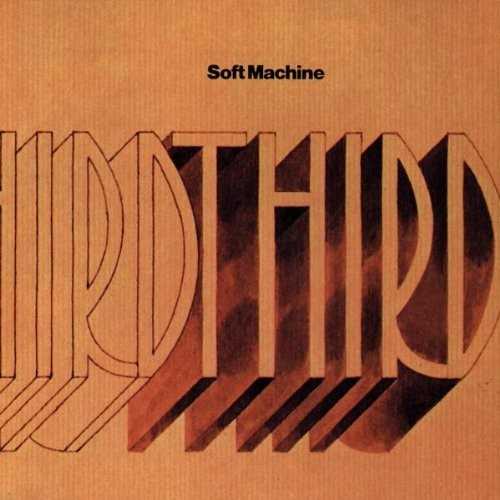 | Album: 3 of 47 Title: Third Released: 1970-06-06 Tracks: 4 Duration: 1:15:20 Scroll: Up Down Top Bottom 25% 50% 75% Spotify TrackSamples Allmusic Wikipedia AlbumCover | 1 Facelift (18:45) 2 Slightly All the Time (18:12) 3 Moon in June (19:08) 4 Out-Bloody-Rageous (19:13) |
| Third : Allmusic album Review : Soft Machine plunged deeper into jazz and contemporary electronic music on this pivotal release, which incited The Village Voice to call it a milestone achievement when it was released. Its a double album of stunning music, with each side devoted to one composition -- two by Mike Ratledge, and one each by Hopper and Wyatt, with substantial help from a number of backup musicians, including Canterbury mainstays Elton Dean and Jimmy Hastings. The Ratledge songs come closest to fusion jazz, although this is fusion laced with tape loop effects and hypnotic, repetitive keyboard patterns. Hugh Hoppers "Facelift" recalls "21st Century Schizoid Man" by King Crimson, although its more complex, with several quite dissimilar sections. The pulsing rhythms, chaotic horn and keyboard sounds, and dark drones on "Facelift" predate some of what Hopper did as a solo artist later (this song was actually culled from two live performances in 1970). On his capricious composition "Moon in June," Robert Wyatt draws on musical ideas from early 1967 demos done with producer Giorgio Gomelsky. Lyrically, its a satirical alternative to the pretension displayed by a lot of rock writing of the era, and combined with the Softs exotic instrumentation, it makes for quite a listen (the compilation Triple Echo includes a BBC broadcast recording of "Moon in June" with different albeit equally fanciful lyrics, and the Robert Wyatt archival collection 68, released by Cuneiform in 2013, features a remastered version of Wyatts original demo of the song, recorded in the U.S. following the Softs tour opening for the Jimi Hendrix Experience). Not exactly rock, Third nonetheless pushed the boundaries of rock into areas previously unexplored, and it managed to do so without sounding self-indulgent. A better introduction to the group is either of the first two records, but once introduced, this is the place to go. | ||
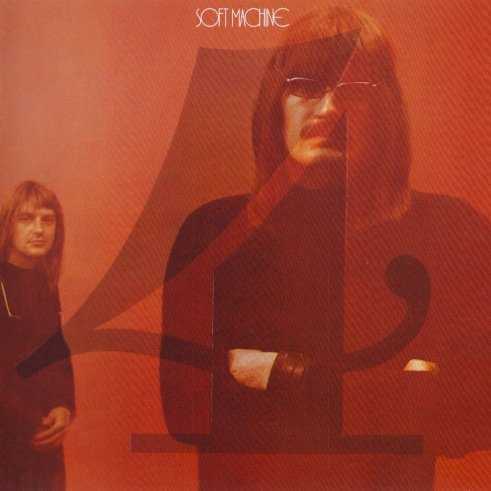 | Album: 4 of 47 Title: Fourth Released: 1971-02 Tracks: 7 Duration: 39:03 Scroll: Up Down Top Bottom 25% 50% 75% Spotify Allmusic Wikipedia AlbumCover | 1 Teeth (09:11) 2 Kings and Queens (05:02) 3 Fletcher’s Blemish (04:35) 4 Virtually, Part 1 (05:14) 5 Virtually, Part 2 (07:04) 6 Virtually, Part 3 (04:36) 7 Virtually, Part 4 (03:19) |
| Fourth : Allmusic album Review : Soft Machines collective skill is hyper-complex and refined, as they are extremely literate in all fields of musical study. Fourth is the bands free purging of all of that knowledge, woven into noisy, smoky structures of sound. Their arcane rhythms have a stop-and-go mentality of their own that sounds incredibly fresh even though it is sonically steeped in soft and warm tones. Obviously there is a lot of skillful playing going on, as the mix of free jazz, straight-ahead jazz, and Gong-like psychedelia coalesces into a skronky plateau. Robert Wyatts drumming is impeccable -- so perfect that it at times becomes an unnoticeable map upon which the bandmembers take their instinctive direction. Mike Ratledges keys are warm throughout, maintaining an earthy quality that keeps its eye on the space between the ground and the heavens that Soft Machine attempt to inhabit. Elton Deans saxophone work screams out the most inventive cadence, and since its hardly rhythmic, it takes front and center, spitting out a crazy language. Certainly the band is the preface to a good portion of Chicagos post-rock output, as the Softs undoubtedly give a nod to Miles Davis Bitches Brew experiments, which were going on in the U.S. at the same time. | ||
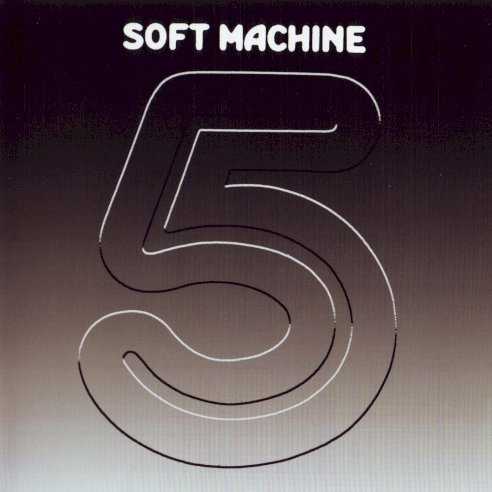 | Album: 5 of 47 Title: Fifth Released: 1972-06 Tracks: 6 Duration: 33:03 Scroll: Up Down Top Bottom 25% 50% 75% Spotify Allmusic Wikipedia AlbumCover | 1 All White (06:01) 2 Drop (07:49) 3 MC (04:54) 4 As If (08:23) 5 LBO (01:33) 6 Pigling Bland (04:21) |
| Fifth : Allmusic album Review : As the Soft Machine moved further away from rock on Third and Fourth, drummer/vocalist Robert Wyatts dissatisfaction with the bands direction grew and, by the time sessions started for Fifth in late 1971, he had left permanently to form Matching Mole. While the instrumental Fourth had forayed deep into jazz-rock territory, Fifth found the Soft Machine working almost completely in the jazz idiom. At the time of Wyatts departure, keyboardist Mike Ratledge commented that the bands co-founder had "never enjoyed or accepted working in complex time signatures." However, Wyatts replacement -- Phil Howard -- didnt prove to be the kind of timekeeper Ratledge and bassist Hugh Hopper had in mind and his free jazz orientation led to his dismissal during the recording of the album. Howards propulsive rhythms nevertheless make a vital contribution to memorable Ratledge compositions like "All White" and "Drop" as they gather momentum and coalesce into driving grooves. "All White" is focused largely on Elton Deans sax performance while "Drop" ultimately showcases the intense busy fuzz of Ratledges organ. In places on Fifth, there does seem to be an element of tension between the more structured approach of Ratledge and Hopper and the free-form inclinations of Dean. The looser style of Deans squalling sax playing is foregrounded particularly on "As If" -- another Ratledge piece. A certain constituency among Soft Machine fans tends to concentrate on the bands earlier releases and to consider everything from Fourth onward less compelling. That attitude has something to do with not being especially interested in jazz, so its not entirely fair to dismiss this album without qualifying such a judgment. Anyone expecting to hear a rock album or a jazz-rock album will probably be disappointed with Fifth. This is essentially a jazz record, more concerned with texture and interplay than with song-based structures. | ||
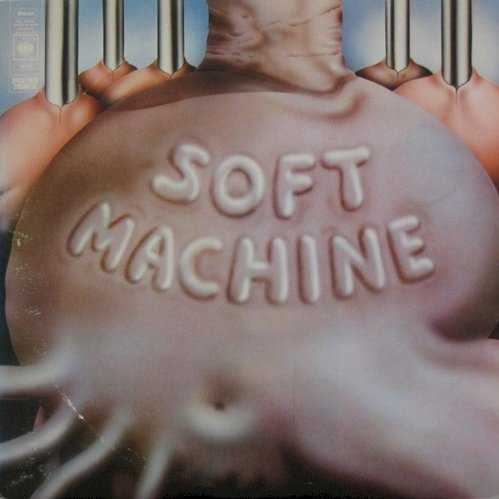 | Album: 6 of 47 Title: Six Released: 1973-02 Tracks: 15 Duration: 1:16:09 Scroll: Up Down Top Bottom 25% 50% 75% Spotify Allmusic Wikipedia AlbumCover | 1 Fanfare (00:43) 2 All White (04:47) 3 Between (02:24) 4 Riff (04:32) 5 37 ½ (06:51) 6 Gesolreut (06:14) 7 E.P.V. (02:46) 8 Lefty (05:00) 9 Stumble (01:36) 10 5 From 13 (For Phil Seamen With Love & Thanks) (05:18) 11 Riff II (01:23) 12 The Soft Weed Factor (11:12) 13 Stanley Stamps Gibbon Album (For B.O.) (05:56) 14 Chloe and the Pirates (09:26) 15 1983 (07:55) |
| Six : Allmusic album Review : The Soft Machine were many things to many people, but to most, the real Soft Machine ceased to exist when founder Robert Wyatt left to work on his conspicuously titled Matching Mole project. This departure is generally credited to the Soft Machines creative advance away from prog rock and toward jazz fusion. Three years and three records after Wyatts departure, this creative motion was in full sail, and the release of Six cemented the band in their distant station beyond the gravity of anything that resembled rock and its spacious, cutting-edge sonics and more symmetrical rhythms. The jazz era that began on Fourth and continued through the 70s mutates slightly on Six, from the free improvisational structures used frequently on prior releases into a somewhat more constrained fusion design. This is due largely to new member Karl Jenkins, who makes a mighty impact on the Soft Machines sound with his sax playing and songwriting -- and who later took creative control over the group, bringing in several guitarists to solidify a fusion sound. Half live and half studio album, Six will never interest classic-era stalwarts, but Jenkins and drummer John Marshall lead old-timers Mike Ratledge and Hugh Hopper through some nifty fusion exercises that fans of the genre (and obscure 70s music of every kind) might find very enjoyable. | ||
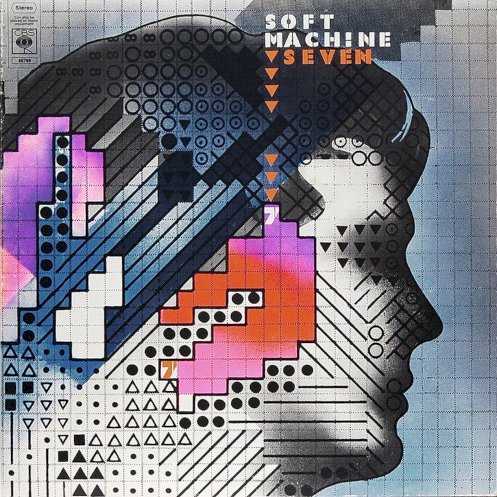 | Album: 7 of 47 Title: Seven Released: 1973-10-27 Tracks: 12 Duration: 43:09 Scroll: Up Down Top Bottom 25% 50% 75% Spotify Allmusic Wikipedia AlbumCover | 1 Nettle Bed (04:48) 2 Carol Ann (03:44) 3 Day’s Eye (05:03) 4 Bone Fire (00:33) 5 Tarabos (04:32) 6 D.I.S. (03:01) 7 Snodland (01:50) 8 Penny Hitch (06:40) 9 Block (04:19) 10 Down the Road (06:03) 11 The German Lesson (01:33) 12 The French Lesson (00:59) |
| Seven : Allmusic album Review : Soft Machines revolving door of personnel changes continued with 1974s Seven, the last Softs album with a numbered title and also the last released by Columbia. Bassist Hugh Hopper was gone, replaced by Roy Babbington, a guest musician on 1971s Fourth who had played bass with Nucleus. Two other Nucleus alumni, keyboardist/reedman Karl Jenkins and drummer John Marshall, were on board as well, and since keyboardist/composer Mike Ratledge was now the bands only founding member (actually, Hopper wasnt an original member either, having replaced Kevin Ayers for Volume Two), the groups links to its early years seemed increasingly tenuous -- and would become more so. Yet when Jenkins had joined the group prior to Six, following the departure of saxophonist Elton Dean, he seemed to bring an intuitive grasp of how Soft Machine could continue moving forward in the bands jazz-rock years while retaining touchstones to the past. A less assertive saxophonist than Dean, Jenkins played multiple reeds but didnt really match Dean as an improviser; his main contributions in the future would be as keyboardist and composer in the ever-evolving Soft Machine style of jazz-rock. And on Seven, he penned seven of the albums 12 tracks, beginning to assume the band leadership role that Ratledge -- who composed four tracks -- shied away from. With Jenkins edging closer to the bands creative center, the Softs forged ahead with their riff- and ostinato-based music, keyboard and reed melodies intersecting at unexpected angles with streamlined yet often odd-metered bass and drums, all flowing forward with muted, spacy sonorities and sometimes hypnotic repetition (and, of course, bridges or codas of echoing keyboard loops). Ratledge composed a trio of connected tracks for Seven, a mini-suite beginning with the modal 9/8 "Days Eye," including a solo feature for him to cut loose with his patented fuzz organ tone, bridging through the brief burst of "Bone Fire" (which puts Jenkins through his paces on baritone sax) to the truly heavy "Tarabos," its bass/keyboard vamp pulling upward and resolving at skewed points along an 18-beat sequence while Jenkins solos wildly with a signal splitter on his horn. But Jenkins sets the albums pace, beginning with the upbeat fuzzy riffing of the opening "Nettle Bed" and the drifting, dreamy "Carol Ann" through his own suite of connected tracks during the second half, including the trance-inducing "Penny Hitch," the full-throttle "Block" (building to an abrupt staccato unison conclusion), and the comparatively relaxed 5/4 vamp of "Down the Road" (featuring a fine arco acoustic bass solo from Babbington). The album ends with three minutes of spacy looping keyboards, split in two with the first part, "The German Lesson," credited to Ratledge as composer and the second part, "The French Lesson," credited to Jenkins, but there is no discernable division or musical difference between them -- no doubt intended as a joke, but also an apt comment on the passing of the torch during Soft Machines 70s jazz-rock years. | ||
![Allmusic album Review : In the extensive discography of Soft Machine, albums from the bands mid- to late-70s jazz-rock period are sometimes afforded the least respect. Fans all have their favorite LPs representing a particular "classic" lineup -- as well as opinions about other albums signifying that Soft Machines best days were behind them. Some feel it was all over when Robert Wyatt left after Fourth (or stopped singing after Third), and its probably even possible to find somebody somewhere who lost interest when Hugh Hopper replaced Kevin Ayers after Volume One. However, nearly everyone agrees that the bands heyday was over by the time the three late-period Soft Machine albums on Harvest were released. And yet, these albums have much to recommend them. The first, Bundles, had the feeling of a new beginning for Soft Machine, for reasons including the label switch from Columbia to Harvest and even the LPs name -- not merely a number like Six or Seven this time around. But the biggest change came from the addition of hotshot guitarist Allan Holdsworth to the lineup, the first time in the bands history that an electric guitarist would be given such a prominent soloing role. Like three other members of the Softs Bundles incarnation -- reedman Karl Jenkins, drummer John Marshall, and bassist Roy Babbington -- Holdsworth had played in Nucleus along with trumpeter Ian Carr, and like those three Nucleus alumni, Bundles introduced him to his largest audience thus far. Holdsworth wasted no time in making an impression. Playing single-note runs on "Hazard Profile, Pt. 1" (based on Jenkins Nucleus composition "Song for the Bearded Lady," first heard on Well Talk About It Later) so insanely fast that even air guitarists might have trouble keeping up, Holdsworth seemed to be a viable Brit entry into the fusion guitarist sweepstakes dominated by the likes of John McLaughlin and Al di Meola.<br><br>Holdsworth provided the band exactly the jolt it required; contrast Bundles with Seven, the comparatively lackluster final Columbia LP, which had the same lineup as Bundles minus the guitarist. Jenkins could be a rather mild and unassertive reed player, leaving it to the ever reliable Mike Ratledges keyboards to take up the slack. But by the time of Bundles, Ratledge himself was beginning to retreat; he had apparently decided to mothball his old fuzz organ, favoring full-chord fills when comping and analog synth for his solo on "Hazard Profile, Pt. 5." Given Ratledges diminishing role, the decision to add Holdsworth to the band came none too soon. Aside from the guitarist, Soft Machines most incendiary player on Bundles turned out to be drummer Marshall, powerful on the straightaway and atmospheric while taking center stage on "Four Gongs Two Drums." As for the material itself, principal composer Jenkins -- who had been gradually taking over the conceptual reins since his first appearance on Six -- had an ability to write sleek and streamlined jazz-rock that still managed to recall the bands past, particularly in his penchant for odd rhythmic permutations ("Bundles") and ethereal, minimalist-influenced keyboard ostinatos ("The Floating World") that harked back to Ratledges tape experimentation on Third. Bundles might not have been classic Soft Machine in most peoples books, but the bands new guitarist, new label, and new outlook seemed to signal a fresh start. As it turned out, Holdsworth would leave before Soft Machines next LP. And, more significantly for any band claiming the Soft Machine name, so would Ratledge, the groups sole remaining original member. And yet the bands story was not over, and there was still some good music to follow. [Several of the strongest tracks from Bundles can also be heard on Tales of Taliesin: The EMI Years Anthology 1975-1981, which also includes selections from Softs, Alive & Well: Recorded in Paris, and Land of Cockayne.] bundles](../../images/soft_machine-bundles.jpg) | Album: 8 of 47 Title: Bundles Released: 1975-03-22 Tracks: 12 Duration: 41:54 Scroll: Up Down Top Bottom 25% 50% 75% Spotify Allmusic Wikipedia AlbumCover | 1 Hazard Profile, Part 1 (09:17) 2 Hazard Profile, Part 2 (02:15) 3 Hazard Profile, Part 3 (01:05) 4 Hazard Profile, Part 4 (00:46) 5 Hazard Profile, Part 5 (05:29) 6 Gone Sailing (00:59) 7 Bundles (03:14) 8 Land of the Bag Snake (03:35) 9 The Man Who Waved at Trains (01:50) 10 Peff (01:57) 11 Four Gongs Two Drums (04:09) 12 The Floating World (07:12) |
| Bundles : Allmusic album Review : In the extensive discography of Soft Machine, albums from the bands mid- to late-70s jazz-rock period are sometimes afforded the least respect. Fans all have their favorite LPs representing a particular "classic" lineup -- as well as opinions about other albums signifying that Soft Machines best days were behind them. Some feel it was all over when Robert Wyatt left after Fourth (or stopped singing after Third), and its probably even possible to find somebody somewhere who lost interest when Hugh Hopper replaced Kevin Ayers after Volume One. However, nearly everyone agrees that the bands heyday was over by the time the three late-period Soft Machine albums on Harvest were released. And yet, these albums have much to recommend them. The first, Bundles, had the feeling of a new beginning for Soft Machine, for reasons including the label switch from Columbia to Harvest and even the LPs name -- not merely a number like Six or Seven this time around. But the biggest change came from the addition of hotshot guitarist Allan Holdsworth to the lineup, the first time in the bands history that an electric guitarist would be given such a prominent soloing role. Like three other members of the Softs Bundles incarnation -- reedman Karl Jenkins, drummer John Marshall, and bassist Roy Babbington -- Holdsworth had played in Nucleus along with trumpeter Ian Carr, and like those three Nucleus alumni, Bundles introduced him to his largest audience thus far. Holdsworth wasted no time in making an impression. Playing single-note runs on "Hazard Profile, Pt. 1" (based on Jenkins Nucleus composition "Song for the Bearded Lady," first heard on Well Talk About It Later) so insanely fast that even air guitarists might have trouble keeping up, Holdsworth seemed to be a viable Brit entry into the fusion guitarist sweepstakes dominated by the likes of John McLaughlin and Al di Meola. Holdsworth provided the band exactly the jolt it required; contrast Bundles with Seven, the comparatively lackluster final Columbia LP, which had the same lineup as Bundles minus the guitarist. Jenkins could be a rather mild and unassertive reed player, leaving it to the ever reliable Mike Ratledges keyboards to take up the slack. But by the time of Bundles, Ratledge himself was beginning to retreat; he had apparently decided to mothball his old fuzz organ, favoring full-chord fills when comping and analog synth for his solo on "Hazard Profile, Pt. 5." Given Ratledges diminishing role, the decision to add Holdsworth to the band came none too soon. Aside from the guitarist, Soft Machines most incendiary player on Bundles turned out to be drummer Marshall, powerful on the straightaway and atmospheric while taking center stage on "Four Gongs Two Drums." As for the material itself, principal composer Jenkins -- who had been gradually taking over the conceptual reins since his first appearance on Six -- had an ability to write sleek and streamlined jazz-rock that still managed to recall the bands past, particularly in his penchant for odd rhythmic permutations ("Bundles") and ethereal, minimalist-influenced keyboard ostinatos ("The Floating World") that harked back to Ratledges tape experimentation on Third. Bundles might not have been classic Soft Machine in most peoples books, but the bands new guitarist, new label, and new outlook seemed to signal a fresh start. As it turned out, Holdsworth would leave before Soft Machines next LP. And, more significantly for any band claiming the Soft Machine name, so would Ratledge, the groups sole remaining original member. And yet the bands story was not over, and there was still some good music to follow. [Several of the strongest tracks from Bundles can also be heard on Tales of Taliesin: The EMI Years Anthology 1975-1981, which also includes selections from Softs, Alive & Well: Recorded in Paris, and Land of Cockayne.] | ||
![Allmusic album Review : At this point in the bands history, Soft Machines lineup might raise the question of Theseus paradox: if all the pieces of something are replaced, bit by bit over time, does the identity of the original something still remain? On Softs, Mike Ratledge, the only original bandmember present on Bundles, the groups preceding Harvest LP, was relegated to guest status, contributing synthesizer to only two tracks, "Song of Aeolus" and "Ban-Ban Caliban." Otherwise, keyboard duties fell completely to Karl Jenkins, who joined the group prior to the recording of Six and had gradually taken over the conceptual reins as the Softs finished their tenure with Columbia and moved over to Harvest. On Softs more than ever before, Soft Machine was Jenkins band; he composed fully seven of the LPs 11 tracks, making the album a vehicle for his own artistic conception. And yet, as Soft Machine albums go, this one is just fine, thank you. Jenkins had always put his own personal stamp on the material he wrote for the band, but he also retained elements of a Soft Machine style that emerged around the time Ratledge began penning LP side-long opuses on Third: a marriage of modalism and minimalism with memorable themes in layered counterpoint and an occasional backdrop of rippling, echoey overdubbed electric keyboards, giving the music a trippy, trance-inducing quality. Nimble keyboard and reed solos were also an important element of the Soft Machine sound, although, as the group entered its Harvest fusion period, they tended to take a back seat to the work of fleet-fingered electric guitarists, first Allan Holdsworth on Bundles and then John Etheridge here.<br><br> With Etheridge proving that Holdsworth wasnt Englands only blindingly fast fusion guitar riff-meister, and with new saxophonist Alan Wakeman being a somewhat heftier reedman than Jenkins, the Softs lineup was plenty strong enough in the soloing department, so Jenkins could concentrate on overdubbing an arsenal of keyboards to give the music its overall structure and mood. Meanwhile, the Roy Babbington (bass) and John Marshall (drums) rhythm-section team, intact since Seven, was as fine as ever, kicking the band into overdrive at the drop of a hi-hat. While Softs has plenty to satisfy the Canterbury and jazz-rock fusion fan, another stylistic element -- new age -- can be heard blowing in with the synthesized wind and strings of the slow and lovely "Song of Aeolus." A precarious balance is usually maintained and the music keeps its footing in jazz-rock, although Softs certainly has more polish than grit. Moments of subtlety and understatement, like the pastoral soprano saxophone and acoustic guitar duet of the opening "Aubade" and Etheridges folk-jazz duet with himself on the album-closing "Etka," are balanced by passages of high drama: the multitudinous layers of guitars and keyboards piled onto the closing of "The Tale of Taliesin" might suggest the Beatles "I Want You (Shes So Heavy)" coda through a widescreen 70s fusion lense. Elsewhere, the careful buildup and breakdown of lovely themes on "Out of Season" and the insistent groove of "Ban-Ban Caliban" are notable highlights. Softs is adventurous listening, yet accessible and engaging enough to have broad appeal, and its stylistic links to the past maintain Soft Machines distinctive identity -- even if this particular machine is constructed of replacement parts. [Some good selections from Softs can also be heard on Tales of Taliesin: The EMI Years Anthology 1975-1981, which also includes selections from Bundles, Alive & Well: Recorded in Paris, and Land of Cockayne.] softs](../../images/soft_machine-softs.jpg) | Album: 9 of 47 Title: Softs Released: 1976-06-25 Tracks: 11 Duration: 45:24 Scroll: Up Down Top Bottom 25% 50% 75% Spotify Allmusic AlbumCover | 1 Aubade (01:51) 2 The Tale of Taliesin (07:17) 3 Ban Ban Caliban (09:22) 4 Song of Aeolus (04:31) 5 Out of Season (05:32) 6 Second Bundle (02:37) 7 Kayoo (03:27) 8 The Camden Tandem (02:01) 9 Nexus (00:49) 10 One Over the Eight (05:31) 11 Etika (02:21) |
| Softs : Allmusic album Review : At this point in the bands history, Soft Machines lineup might raise the question of Theseus paradox: if all the pieces of something are replaced, bit by bit over time, does the identity of the original something still remain? On Softs, Mike Ratledge, the only original bandmember present on Bundles, the groups preceding Harvest LP, was relegated to guest status, contributing synthesizer to only two tracks, "Song of Aeolus" and "Ban-Ban Caliban." Otherwise, keyboard duties fell completely to Karl Jenkins, who joined the group prior to the recording of Six and had gradually taken over the conceptual reins as the Softs finished their tenure with Columbia and moved over to Harvest. On Softs more than ever before, Soft Machine was Jenkins band; he composed fully seven of the LPs 11 tracks, making the album a vehicle for his own artistic conception. And yet, as Soft Machine albums go, this one is just fine, thank you. Jenkins had always put his own personal stamp on the material he wrote for the band, but he also retained elements of a Soft Machine style that emerged around the time Ratledge began penning LP side-long opuses on Third: a marriage of modalism and minimalism with memorable themes in layered counterpoint and an occasional backdrop of rippling, echoey overdubbed electric keyboards, giving the music a trippy, trance-inducing quality. Nimble keyboard and reed solos were also an important element of the Soft Machine sound, although, as the group entered its Harvest fusion period, they tended to take a back seat to the work of fleet-fingered electric guitarists, first Allan Holdsworth on Bundles and then John Etheridge here. With Etheridge proving that Holdsworth wasnt Englands only blindingly fast fusion guitar riff-meister, and with new saxophonist Alan Wakeman being a somewhat heftier reedman than Jenkins, the Softs lineup was plenty strong enough in the soloing department, so Jenkins could concentrate on overdubbing an arsenal of keyboards to give the music its overall structure and mood. Meanwhile, the Roy Babbington (bass) and John Marshall (drums) rhythm-section team, intact since Seven, was as fine as ever, kicking the band into overdrive at the drop of a hi-hat. While Softs has plenty to satisfy the Canterbury and jazz-rock fusion fan, another stylistic element -- new age -- can be heard blowing in with the synthesized wind and strings of the slow and lovely "Song of Aeolus." A precarious balance is usually maintained and the music keeps its footing in jazz-rock, although Softs certainly has more polish than grit. Moments of subtlety and understatement, like the pastoral soprano saxophone and acoustic guitar duet of the opening "Aubade" and Etheridges folk-jazz duet with himself on the album-closing "Etka," are balanced by passages of high drama: the multitudinous layers of guitars and keyboards piled onto the closing of "The Tale of Taliesin" might suggest the Beatles "I Want You (Shes So Heavy)" coda through a widescreen 70s fusion lense. Elsewhere, the careful buildup and breakdown of lovely themes on "Out of Season" and the insistent groove of "Ban-Ban Caliban" are notable highlights. Softs is adventurous listening, yet accessible and engaging enough to have broad appeal, and its stylistic links to the past maintain Soft Machines distinctive identity -- even if this particular machine is constructed of replacement parts. [Some good selections from Softs can also be heard on Tales of Taliesin: The EMI Years Anthology 1975-1981, which also includes selections from Bundles, Alive & Well: Recorded in Paris, and Land of Cockayne.] | ||
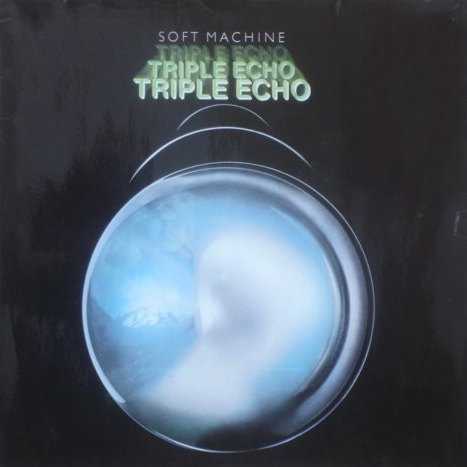 | Album: 10 of 47 Title: Triple Echo Released: 1977-03 Tracks: 21 Duration: 2:26:12 Scroll: Up Down Top Bottom 25% 50% 75% Allmusic AlbumCover | 1 Love Makes Sweet Music (02:27) 2 Feelin’ Reelin’ Squeelin’ (02:50) 3 Memories (02:58) 4 She’s Gone (02:29) 5 Why Am I So Short? / So Boot If at All / A Certain Kind (13:13) 6 We Did It Again / Plus Belle Qu’une Poubelle / Why Are We Sleeping? (10:32) 7 A Concise British Alphabet, Part 2 / Hullo Der / Dada Was Here / Thank You Pierrot Lunaire / Have You Ever Been Grean? / Pataphysical Introduction, Part 2 (07:33) 8 As Long as He Lies Perfectly Still (02:34) 9 Dedicated to You but You Weren’t Listening (02:33) 1 The Moon in June (13:00) 2 Esther’s Nose Job (11:57) 3 Mousetrap / Noisette / Backwards / Mousetrap Reprise (08:46) 4 Slightly All the Time / Out Bloody Rageous / Eamonn Andrews (15:19) 1 Teeth (09:11) 2 Kings and Queens (05:02) 3 All White (06:00) 4 Bone (03:31) 5 Stanley Stamps Gibbon Album (For B.O.) (05:56) 6 Carol Ann (03:44) 7 Hazard Profile, Part 1 (09:17) 8 The Tale of Taliesin (07:17) |
| Triple Echo : Allmusic album Review : Though it is scarcely discernible from the CD box sets that listeners now take for granted, Triple Echo was all but unique when it first appeared in 1977, a three-LP boxed anthology that trawled across an entire career, unearthing outtakes, rarities, radio sessions, and more, to paint a career-spanning portrait of one of Britains best-loved, if least-appreciated, bands. The Soft Machine, after all, had never scored a hit single, never had a number one album -- had never, to be truthful, disturbed the U.K. pop mainstream in the slightest. But their tale was one of the most extraordinary of the age, from their humble beginnings as the launching pad for Kevin Ayers, Daevid Allen, and Robert Wyatt, on through the ceaseless convolutions of nine regular albums and -- according to the accompanying Pete Frame family tree -- no less than 15 different lineups. Lovingly compiled by the bands latest label, Triple Echo opens with both sides of the Softs first single, the almost whimsical "Love Makes Sweet Music," before plowing into a sweet version of Hugh Hoppers "Memories," cut during early sessions with producer Giorgio Gomelsky -- material, of course, that has since become ubiquitous in Softs collecting circles, but had hitherto appeared only on a badly packaged French import compilation. Spellbinding, too, is the bands unreleased second single, Joe Boyds production of Ayers "Shes Gone." The remainder of disc one is devoted to generally unimpeachable highlights from the bands first two albums; disc two, however, opens with a genuine treat, a John Peel Session version of "The Moon in June," radically different from the version subsequently recorded for the groups third album, and frequently regarded as superior, too. Further Peel material follows, as Triple Echo delves into the sole studio legacy of the groups short-lived seven piece lineup. Again, the Softs BBC output is now readily available in a variety of forms, but this not only marked its debut release, it also stands alone among the very first Peel Session-style releases ever. After so much excitement, the third disc returns to the bands regular output, with two (again well-chosen) tracks apiece from Fourth and Fifth, and one each from the four albums thereafter -- it closes with "The Tale of Taliesen" from the recently released Softs album. A very well-designed eight-page booklet completes the package with the aforementioned family tree, some great rare photos, and reasonable track annotation -- everything, in fact, that you could possibly hope to find in a modern box set. Now, if you could just figure out how to get those big black round things into the CD player.... | ||
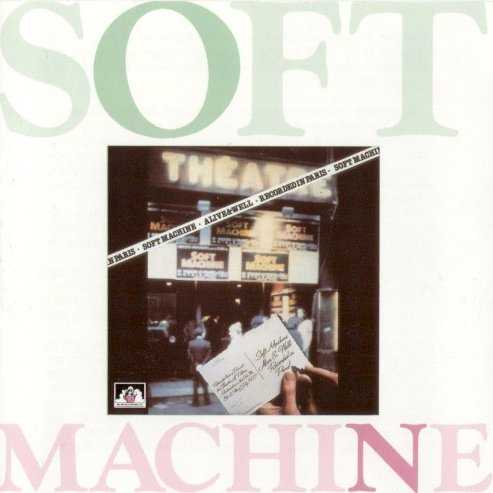 | Album: 11 of 47 Title: Alive and Well in Paris Released: 1978 Tracks: 21 Duration: 1:35:21 Scroll: Up Down Top Bottom 25% 50% 75% Spotify Wikipedia AlbumCover | 1 White Kite (03:00) 2 Eos (01:22) 3 Odds Bullets and Blades Part I (02:18) 4 Odds Bullets and Blades Part II (02:33) 5 Song of the Sunbird (01:24) 6 Puffin (01:18) 7 Huffin (05:12) 8 Number Three (02:25) 9 The Nodder (07:13) 10 Surrounding Silence (04:04) 11 Soft Space (08:16) 1 K’s Riff (04:41) 2 The Nodder (07:12) 3 Two Down (02:26) 4 The Spraunce (06:26) 5 Song of Aeolus (03:40) 6 Sideburn (07:43) 7 The Tale of Taliesin (08:08) 8 Organic Matter / One Over the Eight (05:54) 9 Soft Space Part One (04:15) 10 Soft Space Part Two (05:41) |
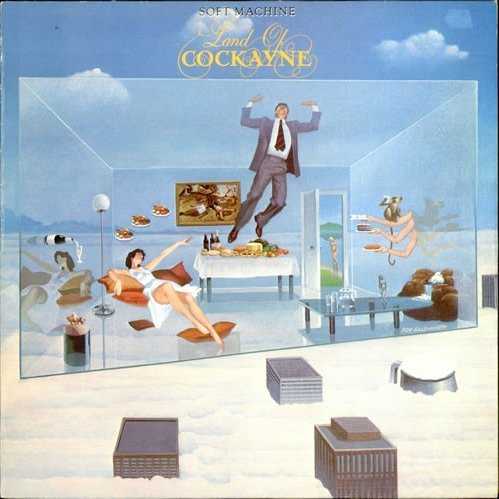 | Album: 12 of 47 Title: Land of Cockayne Released: 1981-03 Tracks: 10 Duration: 43:55 Scroll: Up Down Top Bottom 25% 50% 75% Spotify Wikipedia AlbumCover | 1 Over n Above (07:24) 2 Lotus Groves (04:57) 3 Isle of the Blessed (01:56) 4 Panoramania (07:07) 5 Behind the Crystal Curtain (00:54) 6 Palace of Glass (03:22) 7 Hot-Biscuit Slim (07:27) 8 (Black) Velvet Mountain (05:10) 9 Sly Monkey (05:00) 10 A Lot of What You Fancy... (00:35) |
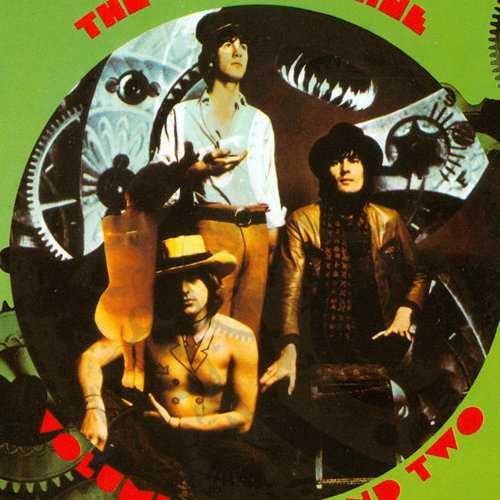 | Album: 13 of 47 Title: Volumes One & Two Released: 1989 Tracks: 30 Duration: 1:14:58 Scroll: Up Down Top Bottom 25% 50% 75% AlbumCover | 1 Hope for Happiness (04:21) 2 Joy of a Toy (02:49) 3 Hope for Happiness (reprise) (01:39) 4 Why Am I So Short? (01:37) 5 So Boot If at All (07:24) 6 A Certain Kind (04:14) 7 Save Yourself (02:25) 8 Priscilla (01:03) 9 Lullabye Letter (04:42) 10 We Did It Again (03:46) 11 Plus belle qu’une poubelle (01:00) 12 Why Are We Sleeping? (05:32) 13 Box 25/4 Lid (00:49) 14 Pataphysical Introduction, Part I (01:00) 15 A Concise British Alphabet, Part I (00:09) 16 Hibou, Anemone and Bear (05:59) 17 A Concise British Alphabet, Part II (00:12) 18 Hulloder (00:54) 19 Dada Was Here (03:25) 20 Thank You Pierrot Lunaire (00:48) 21 Have You Ever Bean Green? (01:19) 22 Pataphysical Introduction, Part II (00:51) 23 Out of Tunes (02:34) 24 As Long as He Lies Perfectly Still (02:34) 25 Dedicated to You but You Weren’t Listening (02:32) 26 Fire Engine Passing With Bells Clanging (01:50) 27 Pig (02:09) 28 Orange Skin Food (01:47) 29 A Door Opens and Closes (01:09) 30 10:30 Returns to the Bedroom (04:13) |
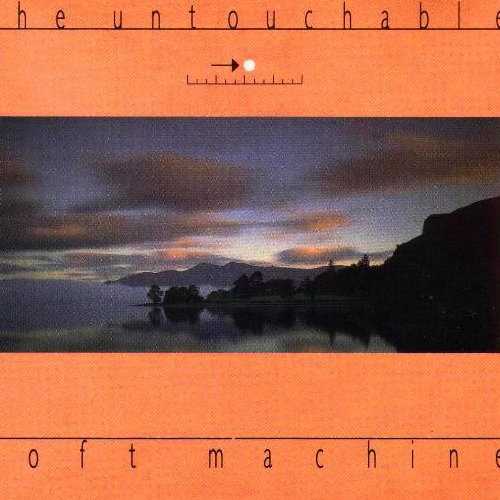 | Album: 14 of 47 Title: The Untouchable Released: 1990 Tracks: 21 Duration: 1:17:52 Scroll: Up Down Top Bottom 25% 50% 75% AlbumCover | 1 Bundles - Hazard Profile Part 1 (09:16) 2 Bundles - Hazard Profile Part 2 (02:15) 3 Bundles - Hazard Profile Part 3 (00:33) 4 Bundles - Hazard Profile Part 4 (01:26) 5 Bundles - Hazard Profile Part 5 (05:21) 6 Bundles - The Man Who Waved At Trains (01:52) 7 Bundles - Peff (03:43) 8 Bundles - Four Gongs Two Drums (02:20) 9 Softs - Ban Ban Caliban (09:28) 10 Softs - Song Of Aeolus (04:22) 11 Softs - Aubade (01:53) 12 Softs - Second Buncle (02:35) 13 Softs - Kayoo (03:28) 14 Softs - Camden Tandem (02:02) 15 Softs - Nexus (00:50) 16 Softs - One Over The Eight (05:32) 17 Softs - Etika (02:22) 18 Alive and Well - Puffin (01:19) 19 Alive and Well - Huffin (04:41) 20 Alive and Well - The Nodder (07:12) 21 Alive and Well - Soft Space (05:22) |
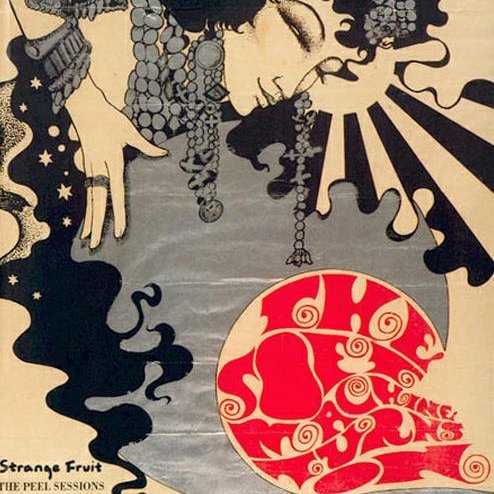 | Album: 15 of 47 Title: The Peel Sessions Released: 1990 Tracks: 10 Duration: 1:36:16 Scroll: Up Down Top Bottom 25% 50% 75% AlbumCover | 1 Moon in June (13:05) 2 Esther’s Nose Job (11:58) 3 Moustrap, Noisette, Backwards, Mousetrap Reprise (08:47) 4 Slightly All the Time, Out-Bloody-Rageous, Eamonn Andrews (15:20) 1 Facelift (11:58) 2 Virtually (09:58) 3 Neo-Caliban Grides (07:34) 4 Drop (06:59) 5 As If (07:49) 6 Dedicated to You but You Weren’t Listening (02:45) |
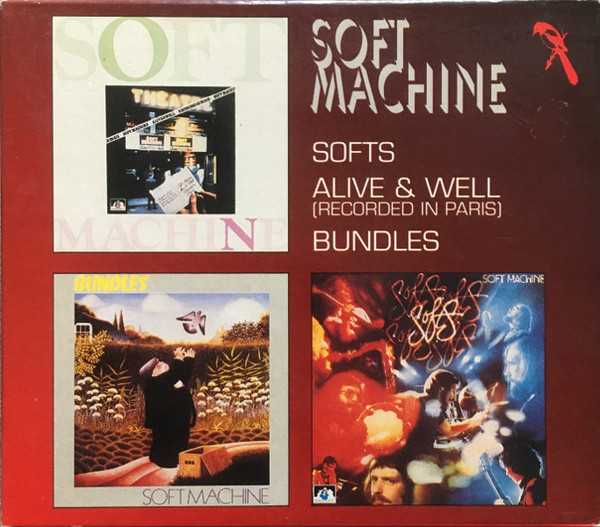 | Album: 16 of 47 Title: Softs / Alive and Well (Recorded in Paris) / Bundles Released: 1992 Tracks: 34 Duration: 00:00 Scroll: Up Down Top Bottom 25% 50% 75% AlbumCover | 1 White Kite (?) 2 Eos (?) 3 Odds Bullets and Blades Pt 1 (?) 4 Odds Bullets and Blades Pt 2 (?) 5 Song of the Sunbird (?) 6 Puffin (?) 7 Huffin (?) 8 Number Three (?) 9 The Nodder (?) 10 Surrounding Silence (?) 11 Soft Space (?) 1 Hazard Profile Part 1 (?) 2 Part 2 (Toccatina) (?) 3 Part 3 (?) 4 Part 4 (?) 5 Part 5 (?) 6 Gone Sailing (?) 7 Bundles (?) 8 Land of the Bag Snake (?) 9 The Man Who Waved at Trains (?) 10 Peff (?) 11 Four Gongs Two Drums (?) 12 The Floating World (?) 1 Aubade (?) 2 The Tale of Taliesin (?) 3 Ban‐Ban Caliban (?) 4 Song of Aeolus (?) 5 Out of Season (?) 6 Second Bundle (?) 7 Kayoo (?) 8 The Camden Tandem (?) 9 Nexus (?) 10 One Over the Eight (?) 11 Etka (?) |
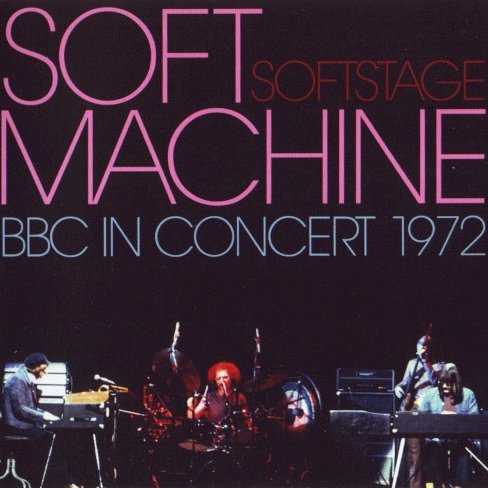 | Album: 17 of 47 Title: BBC Radio 1 Live in Concert 1972 Released: 1994 Tracks: 10 Duration: 54:12 Scroll: Up Down Top Bottom 25% 50% 75% AlbumCover | 1 Fanfare (01:59) 2 All White (05:17) 3 Slightly All the Time (11:51) 4 MC (02:37) 5 Drop (05:34) 6 Stumble (05:53) 7 One Across (03:11) 8 As If (03:48) 9 Riff (07:03) 10 Gesolreut (06:59) |
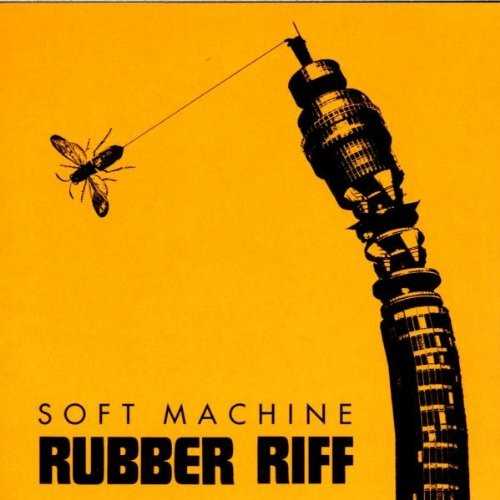 | Album: 18 of 47 Title: Rubber Riff Released: 1994 Tracks: 14 Duration: 38:45 Scroll: Up Down Top Bottom 25% 50% 75% Allmusic AlbumCover | 1 Crunch (02:40) 2 Pavan (02:43) 3 Jombles (03:01) 4 A Little Floating Music (02:51) 5 Hi-Power (02:58) 6 Little Miss B (02:40) 7 Splot (01:57) 8 Rubber Riff (02:42) 9 Sam’s Short Shuffle (02:24) 10 Melina (02:52) 11 City Steps (03:03) 12 Gentle Turn (03:16) 13 Porky (02:49) 14 Travelogy (02:45) |
| Rubber Riff : Allmusic album Review : Back in the days before the Cuneiform and Voiceprint labels began issuing a host of archival Soft Machine music (including reasonably well-recorded live sets from the so-called "classic" period of the band), bootleg tapes -- often live audience recordings of poor quality -- circulated widely among Softs fans. One of those tapes was a mysterious "lost studio album" called Rubber Riff, and fans might be forgiven for enthusiastically seeking out a tape of this session, or at least displaying healthy curiosity about why Soft Machine would record an entire studio LP that would then sit on the shelf, hidden well away from public ears. Granted, the recording was made by a Soft Machine lineup from the groups mid-70s "fusion" period, a band that practically no one viewed as "classic." Nevertheless, keyboardist/composer Karl Jenkins, drummer John Marshall, bassist Roy Babbington, and guitarist John Etheridge had proven themselves capable of kicking out a reasonably solid and occasionally even exciting jazz-rock/fusion effort, Softs, during the same early-1976 time frame that Rubber Riff was recorded, even if the last original Soft Machine member, keyboardist Mike Ratledge, had departed the band for good and was relegated to "guest" status on that LP. So no one was expecting Rubber Riff to be another Third or Fourth, but another Bundles or Softs might not be out of the question. Well, sorry folks, but those who managed to acquire a bootleg tape of Rubber Riff soon learned that the album was quite a different animal than even Bundles or Softs. As author Graham Bennett points out in his Soft Machine biography Out-Bloody-Rageous, at the time of its recording Rubber Riff was not intended to be a Soft Machine release, despite featuring basically the same lineup as Softs (with overdubs from flutist Ray Warleigh added after the principal session had been completed). Rather, Rubber Riff is an album of "library music," 14 instrumental tracks averaging two to three minutes in length and intended to serve as a pleasant and unobtrusive background for various broadcast purposes. As drummer Marshall says in the book, Karl Jenkins was looking toward his own future as a composer, and the Rubber Riff session was a helpful step for Jenkins in "getting his jingle assignments." Thats not to say that the music isnt sometimes energetic, catchy, atmospheric, and even memorable -- although memorable as in the type of tune youd like to force out of your head to make room for something more substantial. At least you can say that, in releasing Rubber Riff as a Soft Machine album in 1994, the Voiceprint label brought to the market a high-quality studio recording rather than a tape of dubious origin sounding like a cassette recorder had been left running on the seat of a cab, motor running and windows shut, waiting outside a venue where Mike Ratledge, Robert Wyatt, and Kevin Ayers may or may not have been playing in 1968. Otherwise, Rubber Riff would be well suited as background music for the Weather Channel, conjuring up such deep thoughts as: "Sunny with a light breeze during the morning hours. Increasing cloudiness in the afternoon with the possibility of a brief shower. Total rain accumulation one-quarter inch. Afternoon high temperature 75 degrees. Clouds clearing by early evening. Overnight temperatures dropping to 60 degrees." Well now, thats rather pleasant indeed. | ||
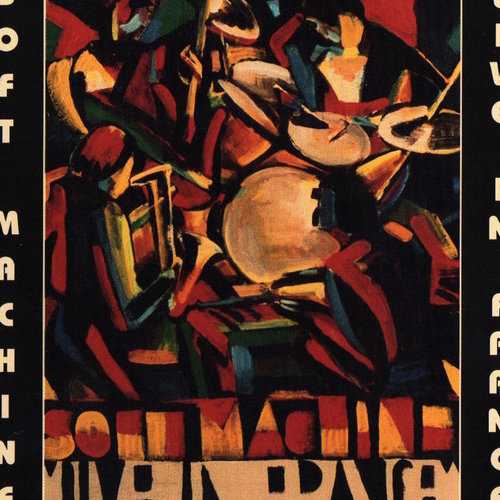 | Album: 19 of 47 Title: Live in France Released: 1995 Tracks: 12 Duration: 1:45:33 Scroll: Up Down Top Bottom 25% 50% 75% AlbumCover | 1 Plain Tiffs (03:31) 2 All White (06:22) 3 Slightly All the Time (13:09) 4 Drop (07:42) 5 M.C. (02:59) 6 Out-Bloody-Rageous (13:25) 1 Facelift (17:49) 2 And Sevens (08:54) 3 As If (08:27) 4 LBO (06:07) 5 Pigling Bland (06:03) 6 At Sixes (11:00) |
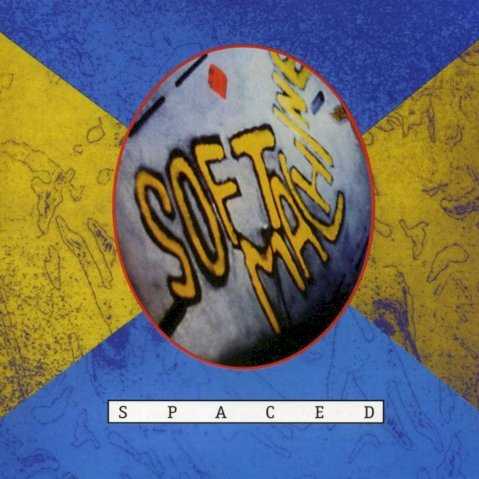 | Album: 20 of 47 Title: Spaced Released: 1996 Tracks: 7 Duration: 1:07:17 Scroll: Up Down Top Bottom 25% 50% 75% Allmusic AlbumCover | 1 Spaced One (12:04) 2 Spaced Two (07:38) 3 Spaced Three (02:58) 4 Spaced Four (32:12) 5 Spaced Five (04:18) 6 Spaced Six (04:12) 7 Spaced Seven (03:52) |
| Spaced : Allmusic album Review : In 1969, Soft Machine were commissioned to provide music for a multimedia show at the Roundhouse in London. As Hugh Hopper writes in the liner notes, "they wanted a backing tape of suitably deranged and doomy sounds," and the group (augmented in parts by saxophonist Brian Hopper) delivered suitably abstract music that was high on improvisational challenge and low on melody. This 67-minute CD was compiled from music used in the show. It varies from off-kilter planetarium-type sounds (especially evident in Mike Ratledges astral electric keyboards) to background-type instrumental jazz-rock to bordering-on-clamorous noisy improv (especially on the 32-minute "Spaced Four"). The sound quality is good, but this is, after all, work that was recorded as a supplement to a performance art event, with a different purpose in mind than home listening. As such, it has to be considered a marginal entry in the Soft Machine discography, of interest almost exclusively to major fans of the band. | ||
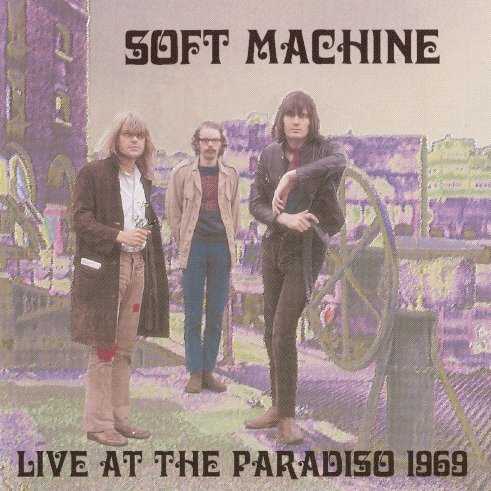 | Album: 21 of 47 Title: Live at the Paradiso Released: 1996-10-28 Tracks: 13 Duration: 40:19 Scroll: Up Down Top Bottom 25% 50% 75% Allmusic AlbumCover | 1 Hulloder (00:24) 2 Dada Was Here (08:21) 3 Thank You Pierrot Lunaire (00:45) 4 Have You Ever Bean Green? (00:57) 5 Pataphysical Introduction, Part 2 (01:00) 6 As Long as He Lies Perfectly Still (01:55) 7 Fire Engine Passing With Bells Clanging (02:17) 8 Hibou, Anemone and Bear (04:17) 9 Fire Engine Passing With Bells Clanging (reprise) (03:26) 10 Pig (04:21) 11 Orange Skin Food (00:15) 12 A Door Opens and Closes (01:18) 13 10:30 Returns to the Bedroom (10:58) |
| Live at the Paradiso : Allmusic album Review : This 45-minute live fragment captures the Soft Machine at the Paradiso Club in Amsterdam circa 1969. The second incarnation of the band included Hugh Hopper (guitar/bass/vocals), Mike Ratledge (keyboards), and Robert Wyatt (drums/vocals). The trio heard here had originally been joined by Kevin Ayers (guitar) on the groups major-label debut Volume One (1968). Not only did that leave the band minus a lead guitarist but a primary contributor to the material as well. The songs are derived from Volume Two (1969), which had been recorded but not yet issued when the Soft Machine set out on tour. While the album is not replicated in its entirety, Live at the Paradiso 1969 (1995) presents a vast majority of the LP with a lean and ravenous capital A Attack. The disc commences with a swirling and swaggering reading of the Hopper-driven medley "Hulloder," "Dada Was Here," "Thank You Pierrot Lunaire," "Have You Ever Bean Green?," and "As Long as He Lies Perfectly Still." This miniature suite was abandoned prior to the creation of the Third (1970) and subsequent repertoire. Those familiar with the original studio platter will note on paper what would appear to be a slight shift in the performance order. Although the credits claim "Hulloder" and "Dada Was Here" are the first two tracks, the opposite is actually the case. This is reversed from the Volume Two rendering as well. As heard here, it works as a cohesive segue with the removal of the free-form "Out of Tunes" and the surreal acoustic ballad "Dedicated to You, But You Werent Listening." As enthusiasts of the group are aware, this show has circulated as a bootleg for well over two decades prior to this sanctioned CD release. However, sound quality was never really an issue as a majority of the various incarnations and titles that have circulated were derived from the same source. Consumers should not be confused as the contents are also available as Live Paradise (1995). | ||
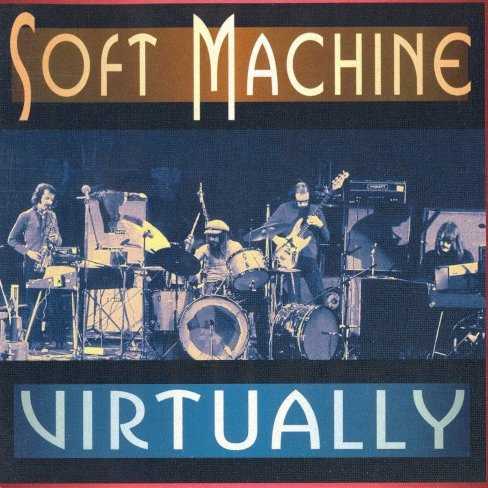 | Album: 22 of 47 Title: Virtually Released: 1998 Tracks: 11 Duration: 1:17:34 Scroll: Up Down Top Bottom 25% 50% 75% Allmusic AlbumCover | 1 Facelift (10:05) 2 Virtually (08:17) 3 Slightly All the Time (08:12) 4 Fletcher’s Blemish (05:53) 5 Neo-Caliban Grides (09:26) 6 Out-Bloody-Rageous (10:00) 7 Eamonn Andrews (04:29) 8 All White (03:16) 9 Kings and Queens (03:37) 10 Teeth (09:20) 11 Pigling Bland (04:55) |
| Virtually : Allmusic album Review : Recorded on March 23, 1971 for Radio Bremen, during the bands final European tour with Robert Wyatt in the lineup, this is a good (and very well-recorded) document of their early-70s sound. At this point the band, having doubled in size around the Third era, had contracted to a quartet with Wyatt, Mike Ratledge, Hugh Hopper, and saxophonist Elton Dean. Over the course of the 77-minute disc, they run through all of the material from Fourth, and much of Third: the music that found them tilting toward jazz, rather than rock. Those who are attracted to the band because of Wyatt may thus be disappointed; his drumming is here in force, but he contributes no original compositions, and his vocals are limited to a few processed scats. Its challenging, at times demanding listening, especially when Dean goes off into improv territory; numbers highlighting Ratledges Lowrey organ hit grooves that are more accessible to rock listeners, but not much. Its certainly better, from both audio and performance aspects, than the Live at the Proms 1970 release, which features the same personnel. | ||
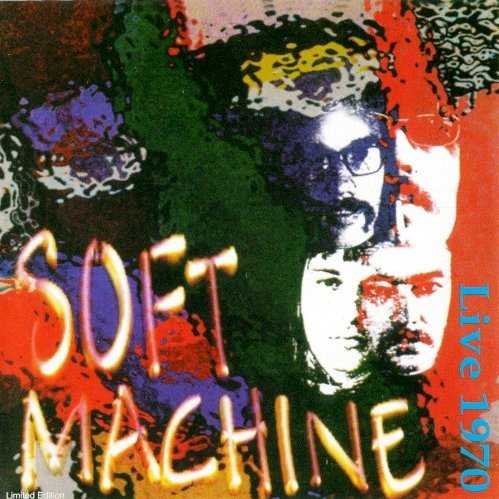 | Album: 23 of 47 Title: Live 1970 Released: 1998 Tracks: 11 Duration: 47:27 Scroll: Up Down Top Bottom 25% 50% 75% Spotify Allmusic AlbumCover | 1 Facelift (excerpt) (05:04) 2 Moon in June (excerpt) (05:59) 3 Out-Bloody-Rageous (08:46) 4 Facelift (11:55) 5 Fire Engine Passing With Bells Clanging (01:31) 6 Pig (01:26) 7 Orange Skin Food (01:43) 8 A Door Opens and Closes (01:12) 9 10:30 Returns to the Bedroom (01:04) 10 Pigling Bland (02:08) 11 10:30 Returns to the Bedroom (reprise) (06:34) |
| Live 1970 : Allmusic album Review : By 1970, the Soft Machine were ensconced into what would become its most revered lineup and repertoire. The two performance excerpts are from one of the many European jaunts the Softs took that year. While the material leans most heavily on the bands Third (1970) album, the second and significantly longer set concludes with the finale from Volume Two (1969). These provide a fascinating timepiece of the group with a slight variation in personnel. The first extract includes an 11-minute-plus workout of "Facelift" and "Moon in June" in a hypersonic scrape-your-face-off-the-wall jam featuring Robert Wyatt (drums), Mike Ratledge (keyboards), Hugh Hopper (bass), and Lyn Dobson (saxophones). On sheer energy and vibe alone, this snippet will prove popular with enthusiasts of this particular vintage. Keen-eared listeners will note the conspicuous absence of Elton Dean (saxophones) during this show. In his liner essay, Hopper recalls that "Elton was presumably stuck somewhere else in Europe...." At the core of Live 1970 is the considerably lengthier portion that commences with "Out-Bloody-Rageous" and a potent "Facelift," recalling the intricate nature and tricky timing of the studio version. The alternately delicate and brash reed work of Dean is showcased here as he vacillates between beautifully gnarled passages and straightforward power blows. The extended non-ensemble section of "Facelift" careens back into a forceful band interaction. A brief solo from Wyatt introduces the Volume Two medley containing "Pig," "Orange Skin Food," "A Door Opens and Closes," and "10:30 Returns to the Bedroom." While these renderings are by and large instrumental, there are a few audible moments of Wyatts trademark rhythmic, wordless vocalizations, although he doesnt seem to have been singing into a proper microphone. In contrast to the earlier bombast, "A Door Opens and Closes" is a breezy fusion of jazz and prog rock. It collides into a decidedly Dadaist "10:30 Returns to the Bedroom," which allows the band to stretch out and get weird before a suitably heavy ensemble conclusion. When coupled with the thoroughly excellent Live at the Paradiso 1969 (1995), Live 1970 is an accurate depiction of the Soft Machines free-form fury running on all sonic cylinders. | ||
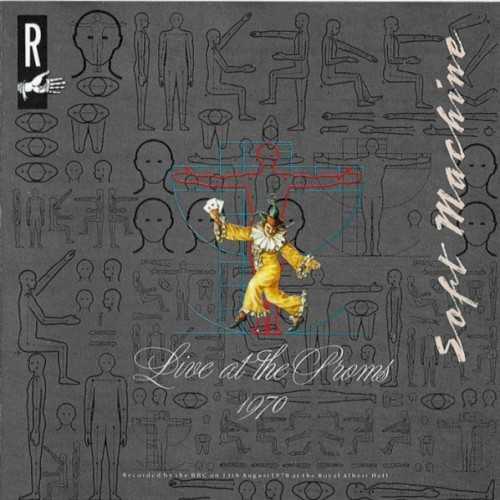 | Album: 24 of 47 Title: Live at the Proms 1970 Released: 1998-08 Tracks: 3 Duration: 38:58 Scroll: Up Down Top Bottom 25% 50% 75% Allmusic AlbumCover | 1 Out-Bloody-Rageous (11:57) 2 Facelift (11:23) 3 Esther’s Nose Job (15:38) |
| Live at the Proms 1970 : Allmusic album Review : Initially recorded for the BBC in August 1970, this is a good document of the group in concert shortly after the release of Third, stripped down to the quartet of Wyatt, Ratledge, Hopper, and saxophonist Elton Dean. Most of the material comes from their second and third albums, and Wyatt, disappointingly, barely sings at all. These versions arent much different from the ones found on the official releases, though theyre perhaps a bit more spontaneous, so this is primarily recommended for hardcore fans. | ||
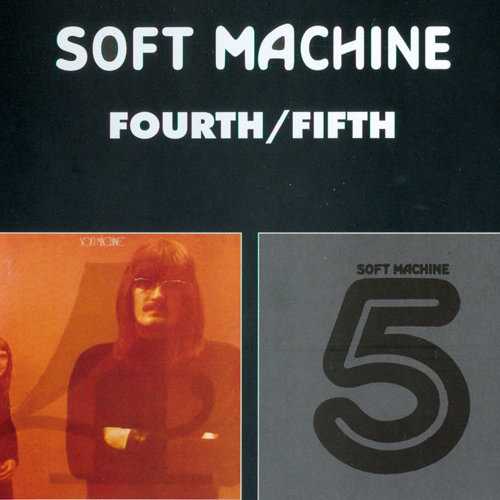 | Album: 25 of 47 Title: Fourth / Fifth Released: 1999 Tracks: 14 Duration: 1:15:38 Scroll: Up Down Top Bottom 25% 50% 75% Allmusic AlbumCover | 1 Teeth (09:11) 2 Kings and Queens (05:02) 3 Fletcher’s Blemish (04:35) 4 Virtually, Part 1 (05:14) 5 Virtually, Part 2 (07:04) 6 Virtually, Part 3 (04:36) 7 Virtually, Part 4 (03:19) 8 All White (06:01) 9 Drop (07:49) 10 MC (04:54) 11 As If (08:23) 12 LBO (01:33) 13 Pigling Bland (04:21) 14 Bone (03:31) |
| Fourth / Fifth : Allmusic album Review : Releasing Soft Machines Fourth and Fifth on one album isnt only convenient, but rather intriguing as well. While both albums display the bands wonderful jazz-rock abstractness and frittering "saxophone versus drums" interweaves, Fourth has the distinction of being the last album to feature drummer Robert Wyatt before he went on to form Matching Mole. The differences between Fourth and Fifth arent startling, but to true Soft Machine fans they are blatantly apparent, since it was Wyatts free-ranged approach which led the band to where they were at that point. Fourth romps and frolics with Mike Ratledges erratic organ meandering under the off-beat but highly colorful drum playing from Wyatt, while Elton Deans sax and saxello playing is nothing more than frantic throughout, gelling their progressive tendencies as a whole without notice. With Phil Howard and John Marshall sharing the drum work for Fifth, there are remnants of Soft Mahines non- structural artiness still remaining, especially on "As Is" and "Pigling Bland," but the same level of groovy spunk and improvised metaphysics in the form of Wyatts off-centeredness is gone. Tracks such as "All White" and "Drop" cant match the hectic, fused frenzy of "Fletchers Blemish" or the excitability that builds during "Teeth" from Fourth. Still, grouping the two albums together as one package is the best way to hear both, even when taking the comparison factor out of the picture. | ||
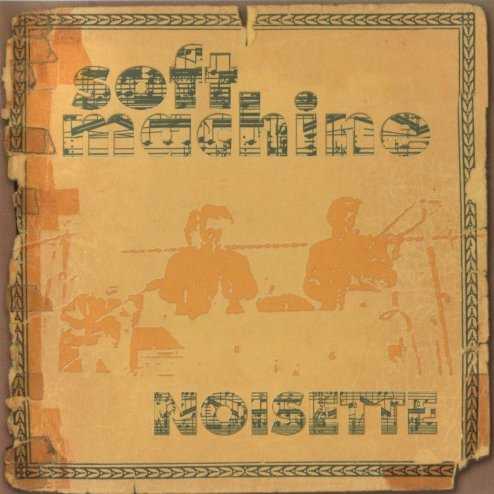 | Album: 26 of 47 Title: Noisette Released: 2000-01-25 Tracks: 10 Duration: 1:13:24 Scroll: Up Down Top Bottom 25% 50% 75% Allmusic AlbumCover | 1 Eamonn Andrews (12:15) 2 Mousetrap (05:24) 3 Noisette (00:37) 4 Backwards (04:47) 5 Mousetrap (reprise) (00:25) 6 Hibou, Anemone and Bear (09:21) 7 Moon in June (06:55) 8 12/8 Theme (11:24) 9 Esther’s Nose Job (14:59) 10 We Did It Again (07:14) |
| Noisette : Allmusic album Review : In more than an hour of music from a January 4, 1970 concert, this represents the group just after they shrank from a septet to a quintet due to the departure of Nick Evans and Marc Charig. Only one other track by these five, "Facelift" (on Third), has previously been released; the five-man lineup would be short-lived, as soprano saxophonist/flautist Lyn Dobson would leave in early 1970. This is at least the sixth release of archival, non-album Soft Machine material from the late 1960s and early 1970s, counting their BBC Peel Sessions compilation, Live at the Proms 1970, Live at the Paradiso 1969, the 1971 show on Virtually, and the previously unreleased 1969 tapes on Spaced. Apparently the well of unissued material from the era is much deeper than anyone thought, and it could be that, all things considered, this release is among the best of the lot. The sound is decent; its certainly better than it is on Live at the Proms 1970. There is a good selection of material from the Third era, not all of which made it onto their studio albums, including "Moon in June," "Eamonn Andrews," "Mousetrap," and "12/8 Theme" (this last track appearing on disc here for the first time). Theres also "Esthers Nose Job" from the second album and Kevin Ayers "We Did It Again" from the debut. At this point the Soft Machine were becoming more of a jazz group than a rock one, and almost wholly instrumental, except for some scattish vocals from Robert Wyatt and Lyn Dobson once in a while. Principally the tone is that of high-energy with occasionally frenzied soloing and dueling between Ratledges electric keyboards and the saxophones, underscored by Wyatts busy drumming and Dobson playing the flute in the Roland Kirk talk-play style on "Backwards," | ||
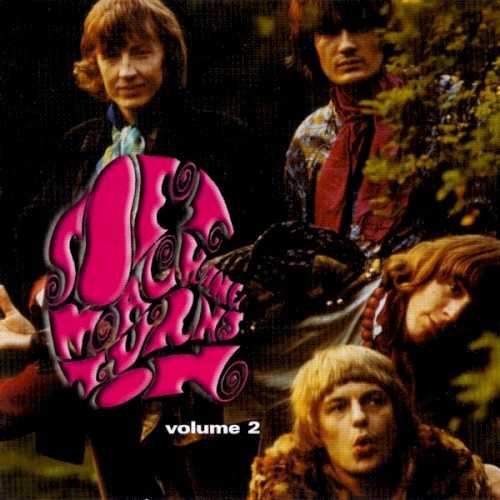 | Album: 27 of 47 Title: Soft Machine Turns On, Volume 2 Released: 2001 Tracks: 14 Duration: 1:13:23 Scroll: Up Down Top Bottom 25% 50% 75% AlbumCover | 1 Moon In June (02:23) 2 I Shouldve Known (13:30) 3 A Certain Kind (04:02) 4 Save Yourself (02:03) 5 Lullaby Letter (09:01) 6 Organistics (05:22) 7 Lullaby Letter / Priscilla / Lullaby Letter (Reprise) (08:03) 8 We Did It Again (01:38) 9 Why Are We Sleeping (05:20) 10 Joy Of A Toy (03:06) 11 Hope For Happiness (04:19) 12 Clarence In Wonderland (01:52) 13 Moon In June (06:24) 14 Esthers Nose Job (06:20) |
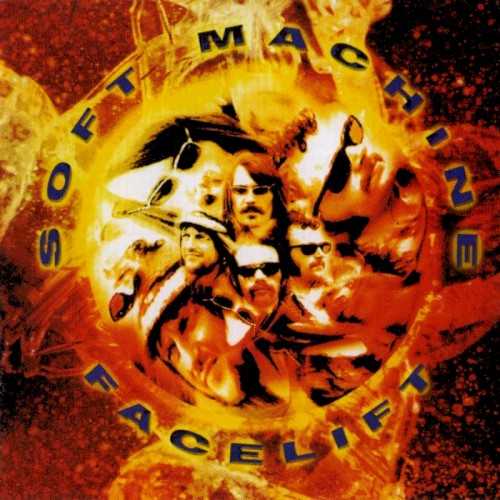 | Album: 28 of 47 Title: Facelift Released: 2002 Tracks: 14 Duration: 1:31:22 Scroll: Up Down Top Bottom 25% 50% 75% Spotify Allmusic AlbumCover | 1 Slightly All the Time (05:20) 2 Out‐Bloody‐Rageous (10:16) 3 Moon in June (05:49) 4 Mousetrap (06:29) 5 Noisette (00:36) 6 Backwards (03:50) 7 Mousetrap (reprise) (00:14) 8 Hibou Anemone & Bear (07:57) 9 Facelift (21:27) 10 Eamonn Andrews (12:12) 11 Esther’s Nose Job (06:50) 12 Pigling Band (03:52) 13 I Should’ve Known (04:47) 14 Esther’s Nose Job (reprise) (01:37) |
| Facelift : Allmusic album Review : In the early 2000s two record labels were competing to release archival recordings by the Soft Machine: the U.S.-based Cuneiform and U.K.-based Voiceprint. While the former dug up excellent radio sessions and live mixing-board recordings from 1970-1971 (released as Virtually, Noisette, and Backwards), the latter relied on much more challenging demo tapes and audience recordings. Facelift presents a complete performance by the quartet version of the group (Mike Ratledge, Elton Dean, Hugh Hopper, Robert Wyatt) recorded from the audience on a small cassette recorder by Brian Hopper, April 26, 1970. Thats four months after the quintet lineup featured on Noisette, a month before one of the sessions on Backwards, just a few days before the Soft Machine entered the studio to record the legendary Third. The set list includes all the material from that album and instrumental versions of the favorite cuts from the previous one ("Eamonn Andrews," "Esthers Nose Job"). Sound quality is typical of an early-70s bootleg. Deans saxophone cuts through nicely, but the drums are muddy -- dont think about evaluating Wyatts playing that night. A couple of speed variations are temporarily irritating. On the other hand, the performance is excellent. Dean shines in "Pigling Bland," Wyatts vocal solo in "Hibou Anemone & Bear" ranks among his best, and the introduction to "Facelift" is as magnificently torturous as it gets. But similar examples of this groups power are available on much better-sounding recordings, leaving Facelift for the completist only. | ||
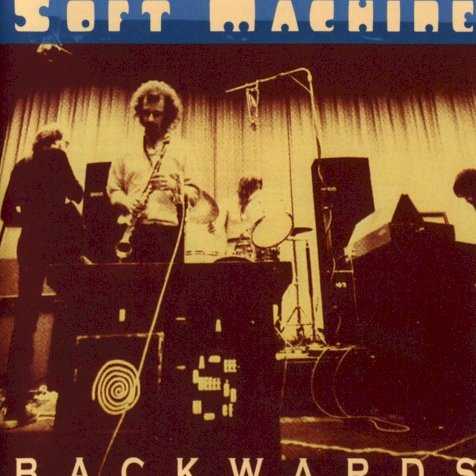 | Album: 29 of 47 Title: Backwards Released: 2002-05-07 Tracks: 6 Duration: 1:12:47 Scroll: Up Down Top Bottom 25% 50% 75% Allmusic AlbumCover | 1 Facelift (1970) (18:40) 2 Moon in June (07:39) 3 Esther’s Nose Job (13:00) 4 Facelift (1969) (08:36) 5 Hibou, Anemone and Bear (04:06) 6 Moon in June (demo) (20:46) |
| Backwards : Allmusic album Review : Albums of archival material by Soft Machine abound, especially when it comes to the era surrounding the groups Third and Fourth albums (1970-1971). While some of these documents hold interest for casual fans (Virtually and Noisette, both good-sounding live sets), Backwards will appeal only to the die-hard Soft head. Culled here are recordings from three different sources that vary in sound quality from good to poor -- but the fan wont mind considering the historical and sentimental importance of some of these tracks. The CD begins in late May 1970 with 40 minutes of material from a typical set of the quartet lineup (Mike Ratledge, Hugh Hopper, Elton Dean, Robert Wyatt). "Facelift," "Moon in June" (the instrumental section), and "Esthers Nose Job" are all well documented, but these interpretations match in quality any others previously available. Then listeners move backward in time (hence the CDs title) to November 1969 for two excerpts of a rare performance by the short-lived "big-band" lineup that added the brass section of Marc Charig, Nick Evans, and Lyn Dobson -- the first two were part of Keith Tippetts sextet and also appeared on King Crimsons album from the same period. They give "Facelift" a...face-lift. The sound is muddy (especially when it comes to organ and drums) but the horns come through crisp and quite exciting. The CD ends with the demo version of Wyatts "Moon in June" (the first part Wyatt solo from late 1968 and the second part with the group from mid-1969). The official version on Third is much superior in all aspects, but this ultra-rare item will satisfy the curiosity of the fans. | ||
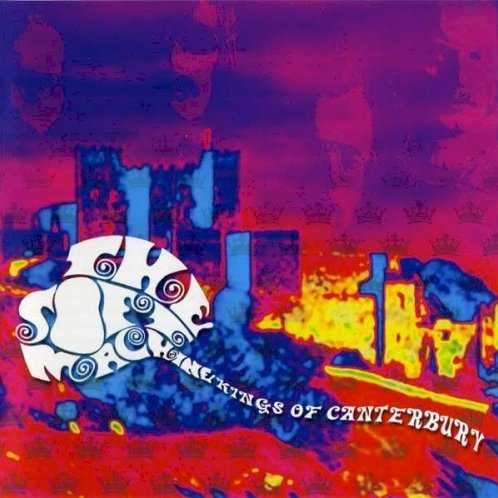 | Album: 30 of 47 Title: Kings of Canterbury Released: 2003 Tracks: 23 Duration: 1:35:52 Scroll: Up Down Top Bottom 25% 50% 75% Allmusic AlbumCover | 1 Hulloder (00:24) 2 Dada Was Here (08:21) 3 Thank You Pierrot Lunaire (00:45) 4 Have You Ever Been Green? (00:57) 5 Pataphysical Introduction, Part II (01:00) 6 As Long as He Lies Perfectly Still (01:55) 7 Fire Engine Passing With Bells Clanging (02:17) 8 Hibou, Anemone and Bear (04:18) 9 Fire Engine (03:22) 10 Facelift (05:03) 11 Moon in June (05:57) 1 Slightly All the Time (05:23) 2 Mousetrap (06:28) 3 Noisette (00:37) 4 Backwards (03:50) 5 Mousetrap (00:16) 6 Eamon Andrews (12:11) 7 Esther’s Nose Job (06:50) 8 Pigling Bland (03:53) 9 I Should’ve Known (04:47) 10 Esther’s Nose Job (reprise) (01:36) 11 Pig (02:57) 12 Orange Skin Food-A Door Opens and Closes-10:30 Returns to the Bedroom (12:41) |
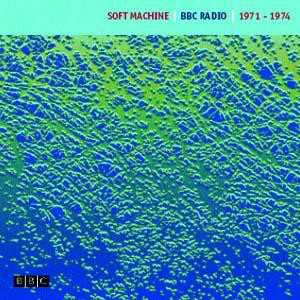 | Album: 31 of 47 Title: BBC Radio 1971-1974 Released: 2003 Tracks: 11 Duration: 1:20:01 Scroll: Up Down Top Bottom 25% 50% 75% Allmusic AlbumCover | 1 As If (07:46) 2 Drop (06:56) 3 Welcome to Frillsville (10:34) 4 Fanfare / All White / MC / Drop (11:14) 5 Stanley Stamps Gibbon Album (03:35) 6 Hazard Profile, Part 1 (04:56) 1 Sinepost (01:47) 2 Down the Road (07:34) 3 North Point (03:00) 4 The Man Who Waved at Trains (05:41) 5 Hazard Profile Parts 1-4 (16:58) |
| BBC Radio 1971-1974 : Allmusic album Review : Combined with Huxs previous Soft Machine BBC anthology, the two-CD BBC Radio 1967-1971, this set (also two CDs) finishes a complete retrospective of the groups BBC sessions. All but two of the tracks on BBC Radio 1971-1974 ("As If" and "Drop," from a November 1971 session) were previously unreleased, and all are in fidelity equal to that heard on the typical studio album. This compilation is considerably less exciting than BBC Radio 1967-1971, largely because it postdates the lineups including Robert Wyatt and/or Kevin Ayers, which produced the bands best work. Still, it does reflect the completion of their journey from a weird psychedelic pop group (as they were in 1967) to a wholly instrumental jazz-rock one, at times much heavier on the jazz than the rock, in one instance (the synthesizer-drum duet "North Point") going beyond jazz into purely avant-garde experimentalism. Four lineups are heard on these four sessions, keyboardist Mike Ratledge being the only constant, but the sound is actually fairly consistent cerebral fusion with a touch of progressive rock, particularly when Ratledges idiosyncratically buzzing organ comes to the fore. At times the material actually goes outside of free jazz territory, especially on the 1971 session when Elton Dean was still part of the lineup. Otherwise, its very much of a piece with the albums from which many of the songs hail (Fifth, Six, Seven, and Bundles), the instrumental proficiency and electric jazz-rock verve not wholly compensating for the loss of wit and humor in the post-Wyatt lineups. | ||
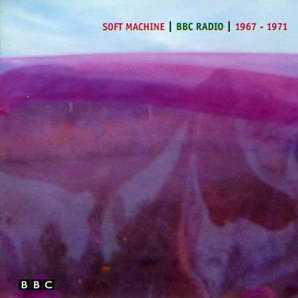 | Album: 32 of 47 Title: BBC Radio 1967-1971 Released: 2003-03-31 Tracks: 15 Duration: 2:07:44 Scroll: Up Down Top Bottom 25% 50% 75% Allmusic AlbumCover | 1 Clarence in Wonderland (02:57) 2 We Know What You Mean (03:11) 3 Certain Kind (03:38) 4 Hope for Happiness (04:37) 5 Strangest Scene (AKA Lullaby Letter) (04:55) 6 Facelift / Mousetrap / Noisette / Backwards / Mousetrap Reprise (11:54) 7 The Moon in June (13:02) 8 Instant Pussy (03:19) 9 Slightly All the Time / Out Bloody Rageous / Eamonn Andrews (19:14) 1 Virtually (09:58) 2 Fletcher’s Blemish (12:11) 3 Neo-Caliban Grides (07:34) 4 Dedicated to You but You Weren’t Listening (02:46) 5 Eamonn Andrews / All White (07:11) 6 Mousetrap / Noisette / Backwards / Mousetrap Reprise / Esther’s Nose Job (21:11) |
| BBC Radio 1967-1971 : Allmusic album Review : There is no shortage of collections of archive material by the Soft Machine and some of them are pretty good (especially the ones released on Cuneiform). But this Hux double-CD compilation is the mother lode. You just cant beat BBC recordings for good sound quality and meaningful "alternate versions." This first volume covers the groups early years up to the departure of drummer Robert Wyatt, starting with a session from December 1967, when the Softs consisted of Kevin Ayers, Mike Ratledge, and Wyatt. Early demo and live versions of dubious quality of "Clarence in Wonderland," "Certain Kind," or "Hope for Happiness" are in circulation (see Turns On, Vol. 1, for instance), but these recordings are far more superior. A session from 1969 features Wyatt, Ratledge, Hugh Hopper, and Brian Hopper in a torrid medley of "Facelift" and the "Mousetrap" suite, but the jewel of the first disc is indisputably a full-band rendition (Ratledge, Wyatt, and Hugh Hopper) of "Moon in June," one of very few times it was performed as such (the studio version was mostly put together by Wyatt overdubbing all parts). Disc two presents sessions from 1971 with Elton Dean added to the regular lineup. The last track is another "Mousetrap" sequence seguing into "Esthers Nose Job," performed by the short-lived septet lineup (with a brass section formed by Dean, Lyn Dobson, Marc Charig, and Nick Evans). This is the closest thing to a studio recording existing by this particular group and it is well-worth the price of admission. If you are a relative newcomer to the music of Soft Machine and are looking to expand beyond their studio releases, start here before moving on to more obscure live sets. | ||
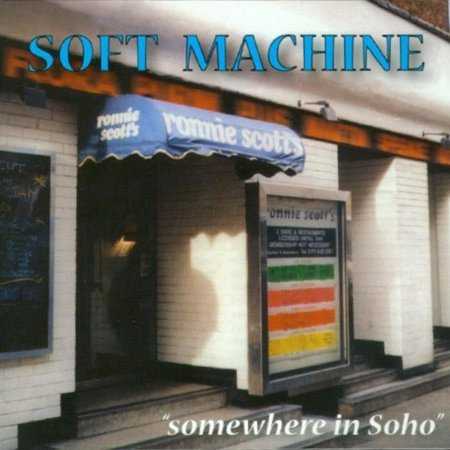 | Album: 33 of 47 Title: Somewhere in Soho Released: 2004-05 Tracks: 14 Duration: 1:31:01 Scroll: Up Down Top Bottom 25% 50% 75% Spotify Allmusic AlbumCover | 1 Slightly All the Time (10:20) 2 Out-Bloody-Rageous (10:46) 3 Eamonn Andrews (10:33) 4 Mousetrap (04:37) 5 Noisette (00:53) 6 Backwards. (03:32) 7 Moustrap (Reprise) (00:23) 8 Hibou Anemone & Bear (04:44) 1 Facelift (19:18) 2 Moon in June (08:02) 3 Esther’s Nose Job (08:21) 4 Pigling Bland (03:45) 5 Cymbalism (04:19) 6 Esther’s Nose Job (reprise) (01:24) |
| Somewhere in Soho : Allmusic album Review : The sheer ubiquity of Soft Machine live recordings ensures that most fans look askance at any new arrivals to the collection. Too many poorly recorded, badly annotated, and, quite honestly, just plain boring CDs have crept out over the years -- hey, is another one really necessary? In this case, yes. Somewhere in Soho was recorded during the bands residency at Ronnie Scotts in London in late April 1970, with the classic Softs lineup of Mike Ratledge, Hugh Hopper, and Robert Wyatt joined by saxophonist Elton Dean -- the sole survivor from an earlier experiment with a brass section. The sound quality is not superb, but its certainly eminently listenable, and the bandmembers themselves sound as relaxed as they ever could be, basically improvising around the contents of their second and third albums (Volume Two and Third) and taking some familiar material to fascinating places. Even Wyatts "Cymbalism" showcase sounds fresh and exciting and, truly, how many times can you say that about an early-70s drum solo? | ||
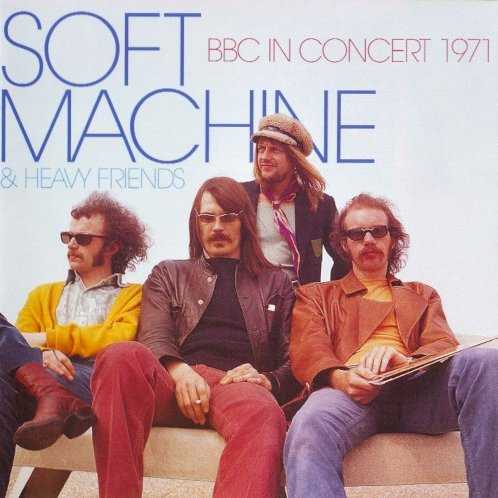 | Album: 34 of 47 Title: BBC Radio 1 Live in Concert Released: 2005 Tracks: 7 Duration: 48:12 Scroll: Up Down Top Bottom 25% 50% 75% Allmusic AlbumCover | 1 Blind Badger (10:08) 2 Neo-Caliban Grides (05:43) 3 Out-Bloody-Rageous (05:19) 4 Eamonn Andrews (01:27) 5 All White (04:58) 6 Kings and Queens (04:41) 7 Teeth, Pigling Bland (15:53) |
| BBC Radio 1 Live in Concert : Allmusic album Review : This live set features the Soft Machine on BBC Radio with host John Peel from a March 1971 broadcast on his legendary In Concert series. This shows uniqueness is immediately evident by the horn-driven ten-piece band with Hugh Hopper (bass), Mike Ratledge (keyboards), Robert Wyatt (drums), Elton Dean (sax), Marc Charig (cornet), Ronnie Scott (tenor sax), Roy Babbington (double bass), Paul Nieman (trombone), Phil Howard (drums), and Neville Whitehead (bass). The combo bears more of a sonic resemblance to the type of stuff that Miles Davis was concurrently doing than to anything even remotely associated with earlier Soft Machine sides. The avant-garde jazz they fully embraced beginning with Third (1970) has translated into one of the most alternately skillful and aggressive of the numerous lineups that the Softs would endure. Despite its sheer size, the band adeptly steers through jazzier numbers such as "Teeth," the driving free-form sizzle of "Neo Caliban Grides," and the opening "Blind Badger." The latter two performances are cut from the same inspired cloth as heard on Deans highly recommended solo debut, Just Us (1971). The double bass, sax, and percussion innately combine on the uninhibited and well-jammed "Out-Bloody-Rageous," especially Ratledges sublime electric piano runs as they dart in and out of the spring-loaded rhythm and brass-filled punctuations. Seasoned listeners should make haste in securing both this disc and the companion volume, BBC Radio 1 Live, Vol. 2 (1994). Anyone looking for a good place to start should direct their efforts toward locating Third and Fourth by the Soft Machine, as well as the previously mentioned and thoroughly excellent Just Us from Elton Dean. | ||
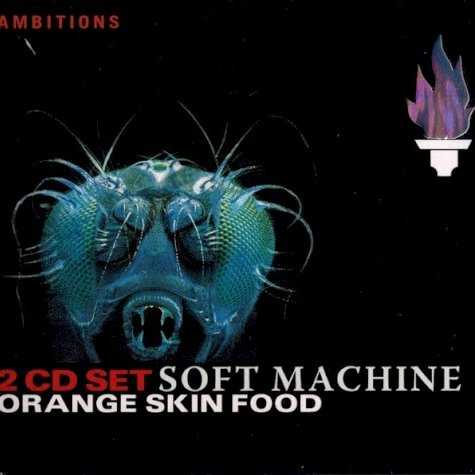 | Album: 35 of 47 Title: Orange Skin Food Released: 2005 Tracks: 23 Duration: 1:54:40 Scroll: Up Down Top Bottom 25% 50% 75% Allmusic AlbumCover | 1 Slightly All the Time (10:20) 2 Out-Bloody-Rageous (10:50) 3 Moon in June (05:51) 4 Mousetrap (04:39) 5 Noisette (00:53) 6 Backwards (03:32) 7 Mousetrap (reprise) (00:23) 8 Hibou Anemone & Bear (04:43) 9 Eamonn Andrews (10:35) 10 Esthers Nose Job (06:52) 11 Pigling Bland (03:52) 1 Facelift (excerpt) (05:03) 2 Moon in June (excerpt) (06:00) 3 Out-Bloody-Rageous (08:46) 4 Facelift (11:55) 5 Fire Engine Passing With Bells Clanging (01:31) 6 Pig (01:25) 7 Orange Skin Food (01:44) 8 A Door Opens and Closes (01:12) 9 10_30 Returns to the Bedroom (01:04) 10 Pigling Band (02:08) 11 10_30 Returns to the Bedroom (reprise) (06:35) 12 I Shouldve Known (04:47) |
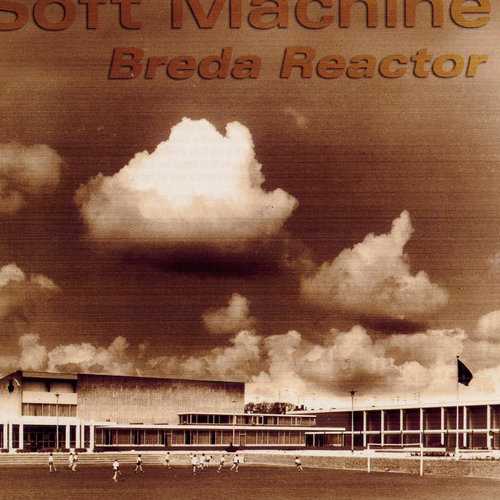 | Album: 36 of 47 Title: Breda Reactor Released: 2005-03-21 Tracks: 16 Duration: 1:28:17 Scroll: Up Down Top Bottom 25% 50% 75% Spotify Allmusic AlbumCover | 1 Eanmonn Andrews (12:52) 2 Mousetrap (05:35) 3 Noisette (00:38) 4 Backwards (04:25) 5 Mousetrap (reprise) (00:15) 6 Hibou Anemone & Bear (09:25) 1 Facelift (21:47) 2 Moon in June (07:14) 3 12/8 Theme (05:16) 4 Drum Link (01:08) 5 Esther’s Nose Job (07:43) 6 Pigling Band (03:23) 7 Cymbalism (01:58) 8 Out-Bloody-Rageous (excerpt) (02:21) 9 Esther’s Nose Job (reprise) (01:56) 10 We Did It Again (02:19) |
| Breda Reactor : Allmusic album Review : In January 1970, Soft Machine worked as a quintet, retaining the services of sax/flute player Lyn Dobson from the previous septet version of the band. Three months later he was gone and the group carried on as a quartet. The quintet recorded only one piece, "Facelift," which appeared on the seminal Third. Breda Reactor presents a near-complete concert performed in Breda, Netherlands, on January 31, 1970. The sound quality is better than on other Soft Machine documents released by Voiceprint, but is still a far cry from the comparatively hi-fi CD Noisette taken from a live performance on January 4, 1970, and released by Cuneiform five years earlier than this one. Tape hiss and distortion abound, some parts are very muddy, and the bass and organ rule the sonic spectrum, leaving very little room for Wyatts drums (which tend to disappear in the background) and the reeds. That being said, Noisette presents a truncated set on a single CD, while Breda Reactor contains a whole (well, almost) concert split across two discs. The set list is rigorously the same, except for the tracks omitted on the Cuneiform album. Among these is the 22-minute "Facelift," a classic if Soft Machine ever had one, here given a thunderous reading. Dobsons Roland Kirk-esque flute solo at the end eases some of the audio shortcomings. By all means, acquire Noisette first: beside the sound quality argument, Elton Dean was in much better shape for that earlier show, and the fade-out two minutes into the encore of "We Did It Again" is frustrating. | ||
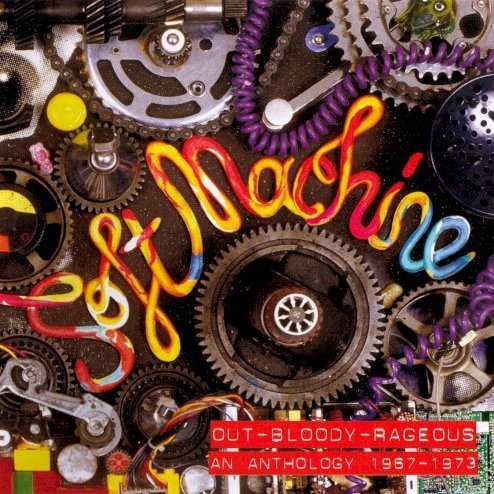 | Album: 37 of 47 Title: Out-Bloody-Rageous: An Anthology 1967-1973 Released: 2005-05 Tracks: 30 Duration: 2:34:03 Scroll: Up Down Top Bottom 25% 50% 75% Allmusic AlbumCover | 1 Feelin’ Reelin’ Squeelin’ (02:50) 2 Love Makes Sweet Music (02:27) 3 Hope for Happiness (04:21) 4 Joy of a Toy (02:50) 5 Hope for Happiness (reprise) (01:38) 6 We Did It Again (03:46) 7 Plus Belle quune Poubelle (01:01) 8 Why Are We Sleeping? (05:33) 9 Pataphysical Introduction, Part One (01:00) 10 A Concise British Alphabet, Part One (00:10) 11 Hibou, Anemone and Bear (05:59) 12 A Concise British Alphabet, Part Two (00:12) 13 Hulloder (00:54) 14 As Long as He Lies Perfectly Still (02:35) 15 Dedicated to You but You Weren’t Listening (02:32) 16 Out-Bloody-Rageous (19:13) 17 Moon in June (19:07) 1 Teeth (09:12) 2 Virtually, Part Four (03:20) 3 Kings and Queens (05:01) 4 All White (06:00) 5 Drop (07:42) 6 Pigling Bland (04:24) 7 Gesolreut (live) (06:17) 8 The Soft Weed Factor (11:13) 9 Chloe and the Pirates (09:28) 10 Penny Hitch (06:40) 11 Down the Road (05:45) 12 The German Lesson (01:52) 13 The French Lesson (01:01) |
| Out-Bloody-Rageous: An Anthology 1967-1973 : Allmusic album Review : Finally, someone put together a high-quality, well-thought-out, and official Soft Machine anthology. Fans have had to wait a long time for this, and Sony International obviously felt the weight of that responsibility. Culled from their ABC/Probe releases through their CBS/Columbia material, these selections are given the grand treatment of faithful (and illuminating) 24-bit remastering by Sony International, as well as a comprehensive and heavily illustrated 16-page booklet detailing the Softs colorful musical history. There is nothing in the way of long-lost live material here, nor are there any rare, basement tracks -- save the inclusion of the bands first single, whose A and B sides appear here, probably for the first time officially -- but there are already several widely available compilations that focus on Soft Machine obscura exclusively, and Sony leaves it to them to enlighten the fanatics who are hungry for the rarest of the rare. As a starting point for new fans, though, this collection is the alpha and omega -- the ultimate overview. Not since Harvests Triple Echo compilation (released nearly 25 years prior) has there been such a propulsive launching point into the weird and wonderful world of the Softs. Not even the stodgiest of Canterbury mavens could argue the pedigree of the tracks selected here -- each one, the cream of the cream, from some very creamy albums indeed. From Volume Ones "Joy of a Toy" to Sevens "Down the Road," Out-Bloody-Rageous covers the bases on this two-disc set better than any anthology has done before, you can bet Robert Wyatts beard on it. | ||
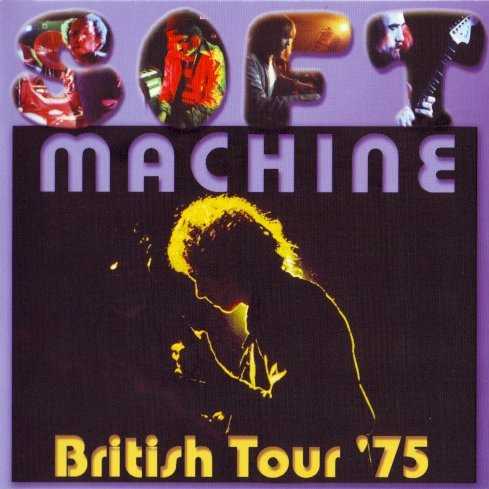 | Album: 38 of 47 Title: British Tour 75 Released: 2005-09-05 Tracks: 15 Duration: 1:17:52 Scroll: Up Down Top Bottom 25% 50% 75% Spotify Allmusic AlbumCover | 1 Bundles (03:17) 2 Land of the Bag Snake (04:01) 3 Out of Season (06:13) 4 The Man Who Waved at Trains (06:15) 5 JVH (04:12) 6 The Floating World (01:12) 7 Ban Ban Caliban (09:53) 8 Sideburn (10:21) 9 Hazard Profile Part 1 (06:12) 10 Hazard Profile Part 2 (01:41) 11 Hazard Profile Part 3 (00:24) 12 Hazard Profile Part 4 (01:30) 13 Hazard Profile Part 5 (03:58) 14 Song of Aeulus (03:58) 15 Sign of Five (14:45) |
| British Tour '75 : Allmusic album Review : "I remember around this time, there were mutterings in the press about this line-up not being genuine Soft Machine," guitarist John Etheridge writes in the liners to British Tour 75, adding, "I personally had no problems with this as I was committed to these four musicians and the great sound of the band." If this accurately summarizes Etheridges feelings he must have had a positive disposition indeed, because to play with such inspiration -- stepping into the shoes of the heralded Allan Holdsworth after that fleet-fingered axeman had departed the Softs in search of a pair of Million Dollar Legs -- while confronting hoots of inauthenticity from the peanut gallery could have tried the patience of a more self-important sort. Putting off the question of whether this "qualifies" as Soft Machine, one might first ask whether it is good music. If youre a fan of the groups early psychedelic pop and despise anything that smacks of "fusion," then British Tour 75 is probably not for you. If, however, you are open to the idea that the latter-period Softs might have brought something unique and idiosyncratically Soft Machine-ish to the fusion table, then you might just find a high level of enjoyment here. For although, as band historian Graham Bennett writes in his definitive Soft Machine biography, Out-Bloody-Rageous, Etheridge joined a group of musicians who were stand-offish and, particularly in the case of founding keyboardist Mike Ratledge, tiring of the grind, there is little evidence of that here. In fact, British Tour 75 catches the band at a uniquely exciting moment before the creative light finally dimmed and went out forever. They were in the middle of a ten-date fall tour of Britain, performing mainly at university venues (this CD was recorded at Nottingham University), and their set featured numbers from both the Holdsworth showcase Bundles and the yet to be released Softs. Bundles multi-part "Hazard Profile," based on a piece composer/keyboardist Karl Jenkins had brought from Nucleus, is positioned as a highlight toward the close of the set (following drummer John Marshalls ten-plus-minute solo showcase, "Sideburn"), and here Etheridge is a strong match for Holdsworths blinding speed, but with his own sense of expressive phrasing and vibrato. Marshall and bassist Roy Babbington had by now evolved into an extraordinary jazz-rock rhythm team, limber, powerful, and quite adept at both nailing a groove ("Ban-Ban Caliban") and handling the changeups and time signature quirks ("Bundles") that composer Jenkins had penned. Jenkins had largely retired his reeds to concentrate on electric piano, and continued to grow in importance as the groups principal composer; one marvels at how his multi-layered compositional style had taken over the Soft Machine sound, gradually and seamlessly, over the passage of time since Six. The bands next studio effort, Softs, would find Jenkins in his most prominent role yet as both composer and architect of the albums tending-toward-new-age feeling, and several key compositions yet to be heard on Softs are featured on British Tour 75. But here the wartsnall live sound has dated better than Softs comparative polish, and founder Ratledge is far from the "guest" he would become on the upcoming studio date. Although he was apparently playing an EMS Synthi A, most notably on the synthesizer break "JVH" (which wouldnt be out of place on Tangerine Dreams Ricochet, recorded live the same year), Ratledge cuts loose on his trademark fuzz organ during "The Man Who Waved at Trains" and "Ban-Ban Caliban," the latter of which would soon appear on Softs in a slicker-sounding version. As Ratledge rips away in the pure Canterbury keyboard style he invented (and had abandoned by now in the studio), one gets the distinct impression that this is not only good music, but that it is also "Soft Machine," the genuine article. | ||
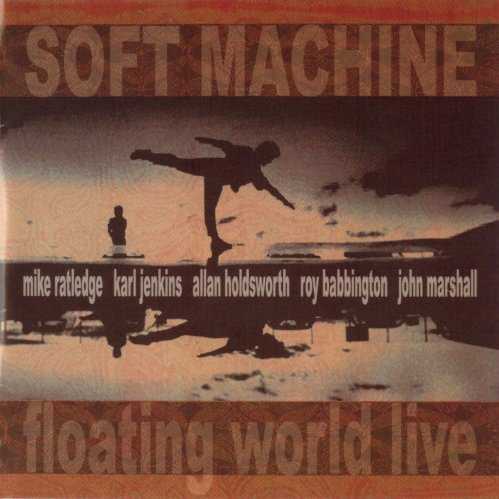 | Album: 39 of 47 Title: Floating World Live Released: 2006-03 Tracks: 13 Duration: 1:13:49 Scroll: Up Down Top Bottom 25% 50% 75% Spotify Allmusic AlbumCover | 1 The Floating World (04:52) 2 Bundles (04:53) 3 Land of the Bag Snake (05:07) 4 Ealing Comedy (06:08) 5 The Man Who Waved at Trains (04:56) 6 Peff (06:29) 7 North Point (04:05) 8 Hazard Profile, Part 1 (04:49) 9 J.S.M. (10:13) 10 Riff III (08:42) 11 Song of Aelous (04:16) 12 Endgame (06:39) 13 Penny Hitch (Coda) (02:40) |
| Floating World Live : Allmusic album Review : With the release of Floating World Live, as of 2006 there were four CDs on the market -- two studio and two live discs -- representing the peak of Soft Machines "guitar fusion" years. Bundles and Softs (studio) and Floating World Live and British Tour 75 (live) are all recommended to anyone for whom jazz-rock fusion doesnt cause a breakout in hives, with the live discs capturing inspired performances and having an edge over the studio efforts. The expertly recorded Floating World is clear evidence that Allan Holdsworth was just what Soft Machine needed in the mid-70s. By the time this live German show had been (partially) captured by Radio Bremen in January 1975, Holdsworth had been with the band for slightly over a year, and the Softs had already recorded Bundles with him. This is a killer live set, and Holdsworths lightning-fast scalar runs, wide-interval leaps, and expressive note-bending over the bands vamps and composer Karl Jenkins chordal changes -- not to mention his prominent positioning in the mix -- make Floating World a must-hear for any fans of the blurry-fingered axeman. He plays a touch of beautiful violin as well. No wonder jaws were dropping all around -- and apparently including the jaws of his bandmates, for Floating World sounds rather less like the work of a fully collaborative band and more like a live date by a guitarist-led fusion outfit than the British Tour 75 recording from later that same year after John Etheridge had joined the group following Holdsworths departure. The flow of the overall Floating World set is at least partially to blame for any slight comparative shortcomings, particularly during the first half but redeemed by some inspired playing from all quarters at the conclusion. The group seems to have barely gotten underway when Roy Babbingtons bass solo, "Ealing Comedy," makes an appearance; its a great showcase including some Canterbury-esque fuzz in the mold of the pioneering Hugh Hopper, but its placement so soon in the proceedings somewhat derails the initial momentum of "Bundles" and "Land of the Bag Snake." And midway through, it doesnt help that "Hazard Profile," the Jenkins multi-part composition that would soon introduce Holdsworth to flabbergasted listeners upon the release of Bundles, fades out after less than five minutes -- thats where the radio station placed its commercial break. (Curious listeners are encouraged to check out the 2015 Cuneiform CD/DVD set Switzerland 1974, which presents a version of the complete "Hazard Profile" from a July 1974 performance at the Montreux Jazz Festival and, in fact, an overall set order more like Bundles itself.) Both the Floating World and British Tour CDs feature solo Mike Ratledge synthesizer and John Marshall drumngong interludes -- here respectively named "North Point" and "J.S.M." -- but on this disc they further tilt the balance away from the full-band music and contribute to the feeling that Soft Machine had become a vehicle for solo statements with Holdsworth leading the way. Still, this is a vital document proving that the Softs were capable of some truly magnificent music during the mid-70s -- and they were still evolving, testing the waters in live performance on a funked-up jam like "Riff III" that would later develop into "Ban-Ban Caliban" after Holdsworth bailed and Etheridge climbed aboard. Floating World Live reveals Soft Machine caught up in the excitement of a new direction thanks to an extraordinary guitarist who provided the band with a much welcome shot in the arm. The new direction heard here would continue with Etheridge blazing his own impossibly fast trails on the six-string, and Soft Machine would experience a final peak -- as demonstrated on British Tour 75, Softs, and Alive & Well: Recorded in Paris -- before dissolution and mediocrity truly began setting in. | ||
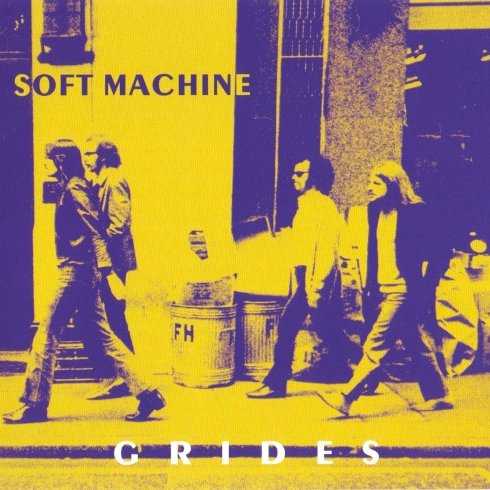 | Album: 40 of 47 Title: Grides Released: 2006-05-23 Tracks: 9 Duration: 1:19:16 Scroll: Up Down Top Bottom 25% 50% 75% Allmusic AlbumCover | 1 Facelift (06:59) 2 Virtually (15:34) 3 Out-Bloody-Rageous (08:12) 4 Neo-Caliban Grides (10:13) 5 Teeth (08:03) 6 Slightly All the Time (10:34) 7 Eamonn Andrews (01:36) 8 Esther’s Nose Job (11:22) 9 Slightly All the Time / Noisette (06:43) |
| Grides : Allmusic album Review : Cuneiform can always be counted on to unearth some gems from the late-60s and early-70s Soft Machine live concert archives, but with the 2006 CD/DVD release Grides the label might have outdone itself. The audio CD features keyboardist Mike Ratledge, bassist Hugh Hopper, saxophonist Elton Dean, and drummer Robert Wyatt performing material mainly from Third and Fourth before what sounds like a huge (and hugely appreciative) audience at Amsterdams Concertgebouw on October 25, 1970. This is a well-recorded document of the "classic" quartet caught live less than four months after the landmark Third had been released and midway through the recording of Fourth, which would be the last of the Softs studio albums featuring Wyatt. As one might expect, Third and Fourth are guiding principles, positioning the band in entirely unique territory with Ratledge as the main composer ("Out-Bloody-Rageous," "Slightly All the Time," "Teeth") and Hopper ("Facelift," "Virtually") not far behind. This is one of Ratledges best showcases for his patented fuzz organ techniques on both thematic material and blistering solos, and also for Hoppers precise use of his foot pedal to kick in a thick fuzz tone when the composition calls for it. Meanwhile, Dean (whose death less than four months prior to the release of Grides lends a touch of sadness to hearing him here) sounds marvelously fiery throughout, with a particularly sharp tone on saxello that nicely complements the timbres produced by Ratledge and Hopper. As for Wyatt, his drumming is often a bit subdued, giving the kit a good thrashing but sometimes falling into the role of strict timekeeper during extended polyrhythmic keyboard/bass vamps. Of course, extended compositions with repetitive patterns, counterpoint, and odd time signatures were very much a part of the bands explorations on Third, and Wyatt may have been attempting to replicate aspects of his approach from that album (e.g, the midsection of "Slightly All the Time"). Elsewhere, there are fascinating glimpses of works in progress -- the "Teeth" opus is missing an incisor or two, absent Ratledges concluding organ solo (Aymeric Leroy states in the extensive liners that the final studio version of "Teeth" that appeared on Fourth would be recorded three weeks later, while Graham Bennett indicates in an appendix to his Softs biography Out-Bloody-Rageous that "Teeth" had already been recorded for Fourth mere days before the band departed for the Netherlands -- on the aural evidence here, one suspects that Leroy is correct) and "Neo-Caliban Grides" includes a Dean-penned rather jagged unison theme stated by sax and piano that suggests the reedman was not ceaselessly pushing the band in a free jazz direction, but could be quite attuned to the type of conception more often linked with Ratledge or Hopper. The CD alone would be a must-have for Soft Machine fans, but the DVD makes this set truly stunning, capturing the same lineup performing for 20-plus minutes on March 23, 1971, at the TV studio of Radio Bremen in Germany, a portion of which was shown on the Beat Club program. The DVD nicely supplements the Virtually audio CD released by Cuneiform in 1998 -- that CD came from the Softs concert recorded by Radio Bremen at the Gondel Filmkunsttheater later on March 23 after they had finished videotaping in the TV studio, and in fact the DVD contains the same first four pieces in the same order ("Neo-Caliban Grides," "Out-Bloody-Ragious," "Eamonn Andrews," and "All White") that began the bands second set heard on Virtually. The mono mix on the DVD places the drums on the verge of inaudibility at times, but the video quality makes up for any lack of audio clarity. Sure, the video transfer to digital lends a sense of druggy unreality to the proceedings even before the light show fully kicks in. But simply put, this full-color psych-o-delic four-camera shoot puts the typical post-millennial music video to shame, coming from that far-distant era when music fans -- even rock music fans -- were interested in seeing musicians actually play their instruments. Thats right: there are lingering shots framed widely enough to watch the bandmembers soloing, interacting, or even sitting out, and very few quick cuts that move your eyes for you. The Softs were almost defiantly serious and non-theatrical (well, Wyatt cant seem to stop a flourish now and then, and his hat is a flourish unto itself), as if saying to their rock audience: hey, this is how jazz musicians do it, folks. But if youre bored by a lack of jumping around and mock emoting, there is the high entertainment value of the blue-screen light show backdrop appearing behind the groups Marshall stacks, coming to the fore and melding with Wyatt himself during the drummers looping vocal improvisation. Its as if the video were initially directed by Jonathan Demme, who momentarily left for a cup of coffee and returned midway through the shoot to find Ken Russell occupying the directors chair, having wandered in from the set of Altered States. Yet even at their trippiest, the visual effects still manage to avoid intruding on the serious business of depicting four musicians playing some of the eras most singularly innovative music in expert fashion. | ||
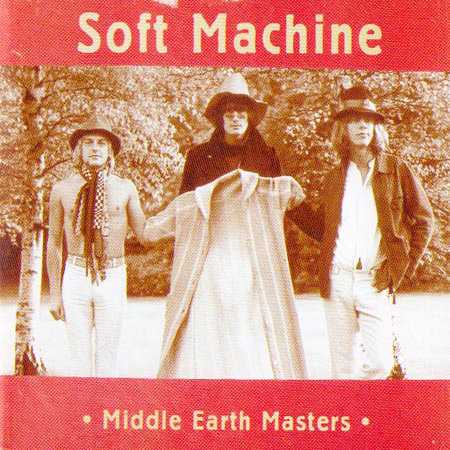 | Album: 41 of 47 Title: Middle Earth Masters Released: 2006-09-01 Tracks: 11 Duration: 1:04:17 Scroll: Up Down Top Bottom 25% 50% 75% Allmusic AlbumCover | 1 Clarence in Wonderland (04:33) 2 We Know What You Mean (03:02) 3 Bossa Nova Express (02:39) 4 Hope for Happiness (13:19) 5 Disorganisation (06:03) 6 We Did It Again (05:48) 7 Why Are We Sleeping? (06:16) 8 I Should’ve Known (09:47) 9 That’s How Much I Need You Now (02:20) 10 I Should’ve Known (06:44) 11 A Certain Kind (03:46) |
| Middle Earth Masters : Allmusic album Review : Soft Machines 1967 lineup was, for most fans, the most essential form of the band -- the core on which every subsequent incarnation would hinge upon in one way or another. Kevin Ayers (bass, guitar, vocals), Mike Ratledge (organ) and Robert Wyatt (drums, vocals) took the notion of the power trio well past its logical potentialities and created a sound that was far beyond mere psychedelia. Elements of jazz, rock and folk were dissected, re-formed (and then blasted) through Softs collective groove machine -- leaving early bystanders wondering what the hell was so "trippy" about Syd Barretts Floyd. This stuff was nuts -- but it was darn good. Soft Machines early live shows were brutally loud and supremely unhinged affairs -- fun for the audience, but a bear for anyone trying to capture a decent recording. Early attempts at getting the live Soft Machine experience on tape were largely failures and, for a long time, thought to be too rough for commercial release -- until now. Bob Woolfords valiant attempt to record Softs September 16, 1967 performance at Covent Gardens Middle Earth club has been resurrected by mastering engineer/sound-surgeon Michael King (through a laborious sequence of sonic repairs) and presented anew by the folks at Cuneiform Records as Middle Earth Masters. Kings painstaking labor of love now provides fans of Soft Machine the closest approximation of what it was like to be in that sprawling basement club with the band blasting out at you from three feet away. Considering the source, the sound is superb, but still plagued with the common problems of a less-than-ideal PA mix. The vocals (both Ayers and Wyatts) are pretty much buried throughout the set (occasionally peeking out during the less bombastic sections). Musical flubs and note missteps abound as well, but are more charming than annoying, giving fans even more of that "just like being there" feeling. All in all, this is not only a good taste of the Soft Machines early live experience, but a good document of the sound and feel of the early British underground scene as well. | ||
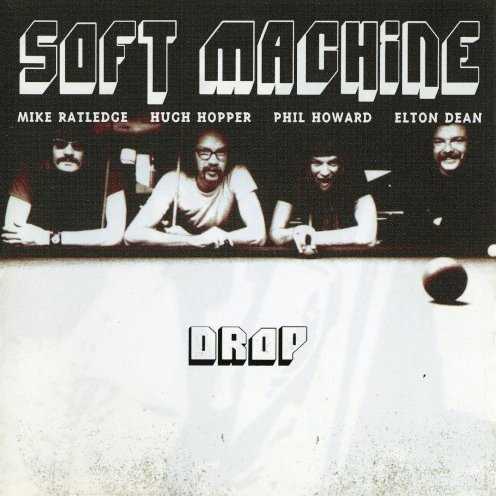 | Album: 42 of 47 Title: Drop Released: 2009 Tracks: 10 Duration: 1:02:10 Scroll: Up Down Top Bottom 25% 50% 75% Spotify Allmusic AlbumCover | 1 Neo Caliban Grides (06:23) 2 All White (06:14) 3 Slightly All the Time (13:16) 4 Drop (07:40) 5 MC (03:25) 6 Out-Bloody-Rageous (11:30) 7 As If (06:10) 8 Dark Swing (01:55) 9 Intropigling (00:53) 10 Pigling Bland (04:44) |
| Drop : Allmusic album Review : Rocket blasting through the stratosphere or train wreck back down on earth? Truth be told, Drop is probably somewhere in the middle; no reasonably well-recorded live Soft Machine CD featuring Mike Ratledge, Hugh Hopper, and Elton Dean -- and thats what Drop is -- will be an unmitigated disaster. But as might be expected, Steve Lakes liner notes for this set, recorded on a German tour in fall 1971 and released on the Moonjune label nearly four decades later in the waning days of 2008, suggest that the version of the band heard here, featuring Phil Howard as a replacement for Robert Wyatt on drums, streaked across the sky rather than tumbled off the tracks. Howard was retained in the drummers chair for only half a studio album back then (Fifth, recorded a short while after the music heard here), and Lake seems to feel that a potential exciting direction went unrealized due to Howards early forced departure. Well, perhaps with Howard as drummer for a while longer, Soft Machine could have realized a wilder and freer form of expression instead of "the shelter of compositional structure and arrangements," as Lake puts it. Then again, maybe the most appropriate reaction to Howards nearly immediate replacement by John Marshall (playing on the other half of Fifth, and everything that came later) would be a collective sigh of relief (even though Elton Deans dissatisfaction with this state of affairs signaled his departure from the group as well). Those believing the progress of "jazz" can be broadly summarized as leading from structure to freedom might -- assuming that Soft Machine had fully transformed themselves into a jazz group by this point -- view Drop as the apotheosis the Softs as jazz musicians. But even "free" drummers are not unfamiliar with the notions of subtlety, nuance, and playing with others as opposed to against them. A tornado of activity to be sure, Phil Howard crashes and bashes nearly nonstop here, his omnipresent ride cymbal washing across nearly everything, the drummer often seemingly oblivious to keyboardist Ratledge, bassist Hopper, and even saxophonist/keyboardist Dean, his supposed free jazz comrade-in-arms -- not to mention the pesky "compositional structure and arrangements," most of which came courtesy of Ratledge. Yes, the versions of "All White," "Drop," "M.C.," "As If," and "Pigling Bland" (which would later appear in more restrained fashion on Fifth) and "Slightly All the Time" and "Out-Bloody-Rageous" (from Third) are filled with fiery energy and some of the most committed playing the Softs ever put on tape (some particularly ear-shattering, note-bending stuff coming from Ratledge), if "committed" means essentially the same thing as "intense." By that measure, Drop is a resounding success. A contrary viewpoint might be supported, however, by comparing Drop to the Live in Paris two-disc set on Cuneiform, recorded after Marshall replaced Howard and featuring (on disc one) five numbers in exactly the same order as they appear on Drop. Substitute Marshall -- a more rigid timekeeper but playing the changes instead of steamrolling through them -- for Howard and the musical result is akin to four people having a spirited dinner conversation versus three people in the dining room shouting to be heard over the clatter of somebody rummaging through pots and pans in the kitchen. Moonjune is to be commended for its archival Soft Machine efforts, not to mention many stellar releases in the post-Canterbury era by both old heroes and new artists who continue to brighten up the music world well into the 21st century. And completists may very well want to plug in a gap in their Soft Machine shelves by snapping up Drop, the one and only Soft Machine album featuring Phil Howard on drums from beginning to end. Others...proceed with caution. | ||
 | Album: 43 of 47 Title: Original Album Classics Released: 2010 Tracks: 46 Duration: 4:37:41 Scroll: Up Down Top Bottom 25% 50% 75% AlbumCover | 1 Facelift (18:45) 2 Slightly All the Time (18:12) 3 Moon in June (19:08) 4 Out-Bloody-Rageous (19:13) 1 Teeth (09:11) 2 Kings and Queens (05:02) 3 Fletcher’s Blemish (04:35) 4 Virtually, Part 1 (05:14) 5 Virtually, Part 2 (07:04) 6 Virtually, Part 3 (04:36) 7 Virtually, Part 4 (03:19) 1 All White (06:00) 2 Drop (07:49) 3 MC (04:54) 4 As If (08:02) 5 L B O (01:53) 6 Pigling Bland (04:21) 7 Bone (03:31) 8 All White (take 2) (07:12) 1 Fanfare (00:43) 2 All White (04:47) 3 Between (02:24) 4 Riff (live) (04:34) 5 37 ½ (06:51) 6 Gesolreut (06:14) 7 E.P.V. (02:46) 8 Lefty (05:00) 9 Stumble (01:36) 10 5 From 13 (For Phil Seamen With Love & Thanks) (05:18) 11 Riff II (01:23) 12 The Soft Weed Factor (11:16) 13 Stanley Stamps Gibbon Album (For B.O.) (05:56) 14 Chloe and the Pirates (09:31) 15 1983 (07:55) 1 Nettle Bed (04:48) 2 Carol Ann (03:44) 3 Day’s Eye (05:03) 4 Bone Fire (00:33) 5 Tarabos (04:32) 6 D.I.S. (03:01) 7 Snodland (01:50) 8 Penny Hitch (06:40) 9 Block (04:19) 10 Down the Road (05:45) 11 The German Lesson (01:52) 12 The French Lesson (00:59) |
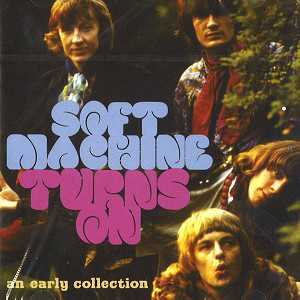 | Album: 44 of 47 Title: Turns On: An Early Collection Released: 2014 Tracks: 30 Duration: 2:26:17 Scroll: Up Down Top Bottom 25% 50% 75% Spotify AlbumCover | 1 I Should’ve Known (07:41) 2 We Know What You Mean (02:55) 3 I’m So Low (02:29) 4 Clarence in Wonderland (02:49) 5 Hope for Happiness (04:25) 6 I Should’ve Known (02:44) 7 We Know What You Mean (03:02) 8 She’s Gone (02:36) 9 Save Yourself (02:08) 10 Lullaby letter (09:29) 11 I Should’ve Known (05:33) 12 A Certain Kind (03:29) 13 Clarence in Wonderland (04:25) 14 May I ? (instrumental variant) (02:43) 15 We Know What You Mean (03:02) 16 Hope for Happiness (13:20) 1 Moon in June (02:21) 2 I Should’ve Known (13:30) 3 A Certain Kind (04:02) 4 Save Yourself (02:02) 5 Lullaby Letter (09:00) 6 Organistics (05:21) 7 Lullaby Letter / Priscilla / Lullaby Letter (reprise) (08:02) 8 We Did It Again (01:37) 9 Why Are We Sleeping (05:20) 10 Joy of a Toy (03:06) 11 Hope for Happiness (04:19) 12 Clarence in Wonderland (01:52) 13 Moon in June (reprise) (06:24) 14 Esther’s Nose Job (06:17) |
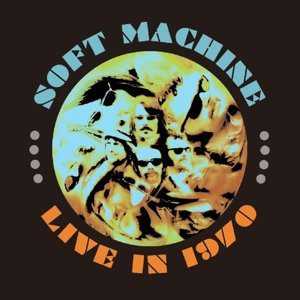 | Album: 45 of 47 Title: Live in 1970 Released: 2014-06-23 Tracks: 30 Duration: 2:59:19 Scroll: Up Down Top Bottom 25% 50% 75% Spotify AlbumCover | 1 Slightly All the Time (10:20) 2 Out-Bloody-Rageous (10:46) 3 Eamonn Andrews (10:33) 4 Mousetrap (04:37) 5 Noisette (00:53) 6 Backwards. (03:32) 7 Moustrap (Reprise) (00:23) 8 Hibou Anemone & Bear (04:44) 1 Facelift (19:18) 2 Moon in June (08:02) 3 Esther’s Nose Job (08:21) 4 Pigling Bland (03:45) 5 Cymbalism (04:19) 6 Esther’s Nose Job (reprise) (01:24) 1 Eanmonn Andrews (12:52) 2 Mousetrap (05:35) 3 Noisette (00:38) 4 Backwards (04:25) 5 Mousetrap (reprise) (00:15) 6 Hibou Anemone & Bear (09:25) 1 Facelift (21:47) 2 Moon in June (07:14) 3 12/8 Theme (05:16) 4 Drum Link (01:08) 5 Esther’s Nose Job (07:43) 6 Pigling Band (03:23) 7 Cymbalism (01:58) 8 Out-Bloody-Rageous (excerpt) (02:21) 9 Esther’s Nose Job (reprise) (01:56) 10 We Did It Again (02:19) |
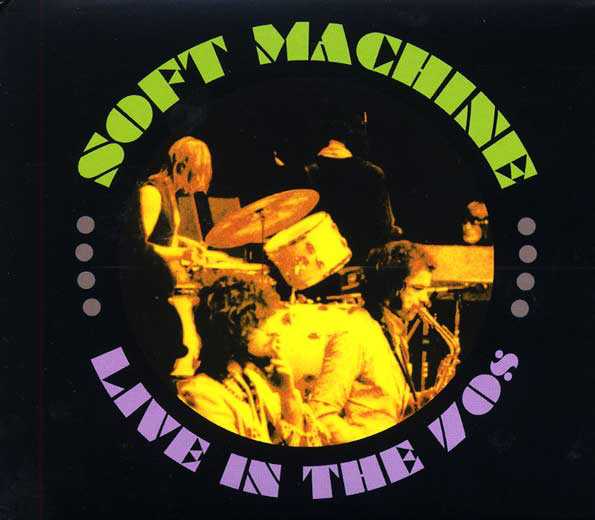 | Album: 46 of 47 Title: Live in the 70s Released: 2015 Tracks: 34 Duration: 4:39:57 Scroll: Up Down Top Bottom 25% 50% 75% Spotify Allmusic AlbumCover | 1 Plain Tiffs (03:44) 2 All White (06:03) 3 Slightly All the Time (13:09) 4 Drop (07:42) 5 M.C. (02:47) 6 Out-Bloody-Rageous (13:35) 7 Facelift (17:49) 8 And Sevens (08:54) 1 As If (08:27) 2 LBO (06:07) 3 Pigling Bland (06:03) 4 At Sixes (10:38) 5 Facelift (1970) (18:40) 6 Moon in June (07:39) 7 Esther’s Nose Job (13:00) 1 Eamonn Andrews (12:15) 2 Mousetrap (05:24) 3 Noisette (00:37) 4 Backwards (04:47) 5 Mousetrap (reprise) (00:25) 6 Hibou, Anemone and Bear (09:21) 7 Moon in June (06:55) 8 12/8 Theme (11:24) 9 Esther’s Nose Job (14:59) 10 We Did It Again (07:14) 1 Neo Caliban Grides (06:22) 2 All White (06:14) 3 Slightly All the Time (13:16) 4 Drop (07:40) 5 MC (03:25) 6 Out-Bloody-Rageous (11:30) 7 As If (06:10) 8 Dark Swing / Intropigling (02:47) 9 Pigling Bland (04:44) |
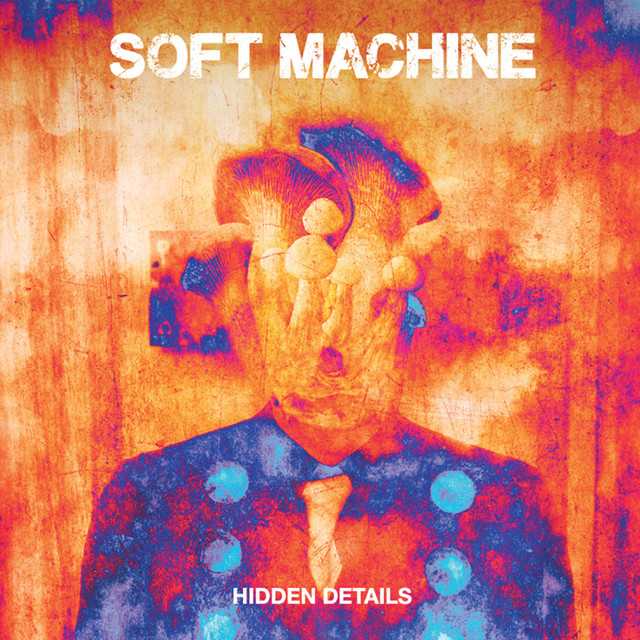 | Album: 47 of 47 Title: Hidden Details Released: 2018-09-07 Tracks: 14 Duration: 1:03:21 Scroll: Up Down Top Bottom 25% 50% 75% Spotify AlbumCover | 1 Hidden Details (07:36) 2 The Man Who Waved At Trains (05:00) 3 Ground Lift (05:21) 4 Heart Off Guard (02:29) 5 Broken Hill (03:49) 6 Flight Of The Jett (02:12) 7 One Glove (04:30) 8 Out Bloody Intro (02:41) 9 Out Bloody Rageous (Part 1) (04:56) 10 Drifting White (01:47) 11 Life On Bridges (08:05) 12 Fourteen Hour Dream (06:24) 13 Breathe (05:12) 14 Night Sky (03:19) |